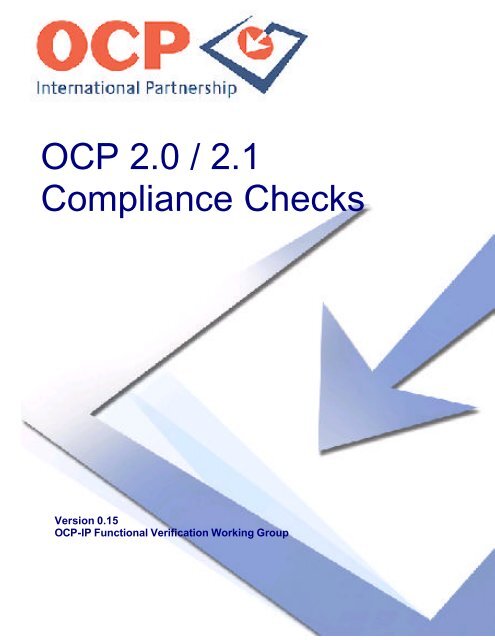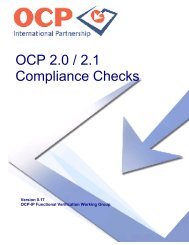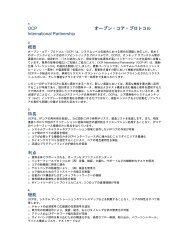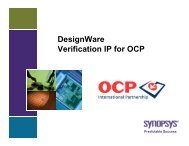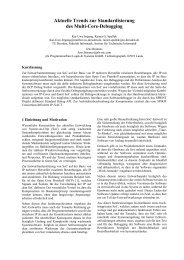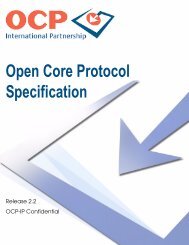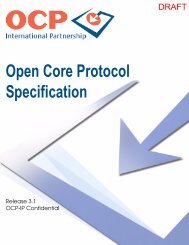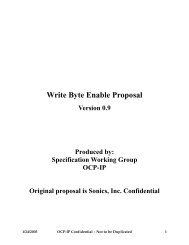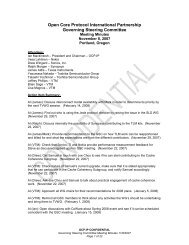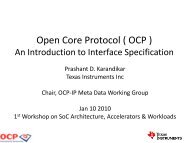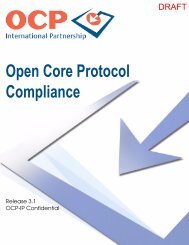OCP Comliance Checks_101905 - OCP-IP
OCP Comliance Checks_101905 - OCP-IP
OCP Comliance Checks_101905 - OCP-IP
Create successful ePaper yourself
Turn your PDF publications into a flip-book with our unique Google optimized e-Paper software.
<strong>OCP</strong> 2.0 / 2.1Compliance <strong>Checks</strong>Version 0.15<strong>OCP</strong>-<strong>IP</strong> Functional Verification Working Group<strong>OCP</strong>-<strong>IP</strong> Confidential
<strong>OCP</strong> 2.0 / 2.1Compliance <strong>Checks</strong>The Overriding Document On <strong>OCP</strong> Certification Is the Current <strong>OCP</strong> Specification<strong>OCP</strong>-<strong>IP</strong> Confidential
Copyright © 2005 <strong>OCP</strong>-<strong>IP</strong>This document contains material that is confidential to <strong>OCP</strong>-<strong>IP</strong> and its members and licensors. The user should assume that all materialscontained and/or references d in this document are confidential and proprietary unless otherwise indicated or apparent from the nature ofsuch materials (for example, references to publicly available forms or documents). Disclosure or use of this document or any materialcontained herein, other than as expressly permitted, is prohibited without the prior written consent of <strong>OCP</strong>-<strong>IP</strong> or such other party thatmay grant permission to use its proprietary material.The trademarks, logos, and service marks displayed in this document are the registered and unregistered trademarks of <strong>OCP</strong> -<strong>IP</strong>, itsmembers and its licensors.The copyright and trademarks owned by <strong>OCP</strong>-<strong>IP</strong>, whether registered or unregistered, may not be used in connection with any product orservice that is not owned, approved or distributed by <strong>OCP</strong>-<strong>IP</strong>, and may not be used in any manner that is likely to cause customerconfusion or that disparages <strong>OCP</strong>-<strong>IP</strong>. Nothing contained in this document should be construed as granting by implication, estoppel, orotherwise, any license or right to use any copyright without the express written consent of <strong>OCP</strong>-<strong>IP</strong>, its licens ors or a third party owner ofany such trademark.iiDISCLAIMERThis <strong>OCP</strong> -<strong>IP</strong> document is provided "as is" with no warranties whatsoever, including any warranty of merchantability, noninfringement,fitness for any particular purpose, or any warranty otherwise arising out of any proposal, specification or sample. <strong>OCP</strong>-<strong>IP</strong> disclaims allliability for infringement of proprietary rights, relating to use of information in this document. No license, express or implied, by estoppelor otherwise, to any intellectual property rights is granted herein.<strong>OCP</strong> International Partnership (<strong>OCP</strong>-<strong>IP</strong>) disclaims all warranties and liability for the use of this document and the information containedherein and assumes no responsibility for any errors that may appear in this document, no r does <strong>OCP</strong>-<strong>IP</strong> make a commitment to updatethe information contained herein.Contact the <strong>OCP</strong>-<strong>IP</strong> office to obtain the latest revision of this document.Questions regarding this document or membership in <strong>OCP</strong>-<strong>IP</strong> may be forwarded to:<strong>OCP</strong>-<strong>IP</strong>www.ocpip.orgE-mail: admin@ocpip.orgPhone: +1 503-291-2560Fax: +1 503-297-1090<strong>OCP</strong>-<strong>IP</strong> Technical Supporttechsupport@ocpip.org<strong>OCP</strong>-<strong>IP</strong> Confidential
Revision HistoryiiiVersion Date Author Comments0.1 08/05/20040.2 09/11/20040.3Samuel Dellacherie(TransEDA)Samuel Dellacherie(TransEDA)Original text-based proposaltakes into account :Sonics list of checksYogitech list of checksnew TransEDA list v1.5.4TI feedback (Jeroen Vliegen)Yogitech feedback (Natale Barsotti)0.419/11/2004Samuel Dellacherie(TransEDA)Reorganization of all properties for a better clarity0.50.6 14/02/20050.7 08/04/200508 30/04/2005Samuel Dellacherie(TransEDA)Samuel Dellacherie(TransEDA)Samuel Dellacherie(TransEDA)John Robiola(Sonics Inc.)Feedback from <strong>OCP</strong>-<strong>IP</strong> support and xls file from TIElimination of:cross-constraint sectionperformance propertiessampling propertiesIncludes corrections based on the final golden xls sheetfrom the FVWG. Follows the order of the golden xls list.Adds references to the <strong>OCP</strong> SpecificationMinor correctionsAdded summary table and formatted document to conform0.9 06/06/2005Samuel Dellacherie(TransEDA)0.10 05/07/2005 Samuel DellacherieFilled-in all blanks, added intro, changed section namesAdded Jeroen’s Intro and formattingCorrections based on Jeroen’s, Anshul’s and Ravi’sfeedbacks. Plus minor changes.0.11 04/08/20050.12 29/08/2005Jeroen Vliegen(Texas Instruments)Jeroen Vliegen(Texas Instruments)Incorporated feedback of Drew Wingard (Sonics/SWG)Rewrote introduction chapter for more clarityAdded acknowledgements1) Added Steven McMaster’s (Synopsys) feedback for theformal verification paragraph (new text)2) Added Anssi Haverinen’s (Nokia) feedback for property3.4.113) Added Christophe Sucur’s (TI) feedback4) Updated figure 1 and former core_rtl.conf paragraphbased on FVWG discussion of 16/08/20055) Added Yogitech’s feedback on document v0.116) Added the 2.1 <strong>OCP</strong> properties7) Added 2.1 specification references8) did some overall formatting<strong>OCP</strong>-<strong>IP</strong> Confidential
ivVersion Date Author Comments0.13 05/09/2005 Samuel Dellacherie1) mod ifications to the « dynamic verification » and « staticverification » sub-sections2) added section 2.3 on which parameters activate whichchecks3) checked Anshul’s feedback4) erased the “transaction” properties of 2.1 that wereduplicates of the 2.0 versionsMany updates. Mainly around 2.1 properties. Please referto “changes_v14.xls” for the entire list!0.14 22/09/2005 Jeroen VliegenAdd burst_hold_MTagInOrderChange name of … see email Samuel0.15 03/10/2005 Jeroen VliegenFinal review of FVWG required 2 changes:1. Add burst_hold_MTagInOrder property2. Changeburst_order_MTagID_when_MTagInOrder_zero toburst_hold_MTagID_when_MTagInOrder_zeroTables are updated / TOC is updated / d ocument is readyfor Tec Writer review !!<strong>OCP</strong>-<strong>IP</strong> Confidential
vContents1 Introduction 21.1 <strong>OCP</strong> Compliance Definition ............................................................................................................21.2 <strong>OCP</strong> Configurability...........................................................................................................................21.3 Verification Techniques....................................................................................................................21.4 This Document Contains .................................................................................................................21.5 Acknowledgements ...........................................................................................................................22 Compliance <strong>Checks</strong> Tables 22.1 Introduction...........................................................................................................................................22.2 Table of <strong>Checks</strong> ..................................................................................................................................22.3 Activation Table ..................................................................................................................................23 Compliance <strong>Checks</strong> Details 23.1 Introduction...........................................................................................................................................23.2 Dataflow Signals <strong>Checks</strong> .................................................................................................................23.2.1 signal_valid__when_reset_inactive ............ 23.2.2 request_valid_ ............................... 23.2.3 datahs_valid_ ................................ 23.2.4 response_valid_ .............................. 23.2.5 request_valid_MTagInOrder ............................ 23.2.6 response_valid_STagInOrder ........................... 23.2.7 request_valid_MTagID_when_MTagInOrder_zero ........... 23.2.8 datahs_valid_MDataTagID_when_MTagInOrder_zero ........ 23.2.9 response_valid_STagID_when_STagInOrder_zero .......... 23.3 DataFlow Phase <strong>Checks</strong> .................................................................................................................23.3.1 request_exact_SThreadBusy ............................ 23.3.2 request_hold_ ................................ 23.3.3 request_value_MCmd_ ......................... 23.3.4 request_value_MAddr_word_aligned ..................... 23.3.5 request_value_MAtomicLength_0x0 ...................... 23.3.6 request_value_MBurstSeq_ ................... 23.3.7 request_value_MBurstSeq_0x7 .......................... 23.3.8 request_value_MBurstLength_0x0 ....................... 23.3.9 request_value_MByteEn_force_aligned .................. 23.3.10 request_value_MThreadID .............................. 23.3.11 datahs_exact_SDataThreadBusy ......................... 23.3.12 datahs_hold_ ................................. 23.3.13 datahs_value_MDataByteEn_force_aligned ............... 23.3.14 datahs_value_MDataThreadID ........................... 23.3.15 response_exact_MThreadBusy ........................... 23.3.16 response_hold_ ............................... 23.3.17 response_value_SResp_FAIL_without_WRC ................ 2<strong>OCP</strong>-<strong>IP</strong> Confidential
vi3.3.18 response_value_SThreadID ............................. 23.3.19 request_hold_MTagInOrder ............................. 23.3.20 response_hold_STagInOrder ............................ 23.3.21 request_hold_MTagID_when_MTagInOrder_zero ............ 23.3.22 datahs_hold_MDataTagID_when_MTagInOrder_zero ......... 23.3.23 response_hold_STagID_when_STagInOrder_zero ........... 23.3.24 request_value_MTagID_when_MTagInOrder_zero ........... 23.3.25 datahs_value_MDataTagID_when_MTagInOrder_zero ........ 23.3.26 response_value_STagID_when_STagInOrder_zero .......... 23.3.27 datahs_order_MDataTagID_when_MTagInOrder_zero ........ 23.3.28 response_reorder_STagID_tag_interleave_size .......... 23.3.29 response_reorder_STagID_overlapping_addresses ........ 23.4 Dataflow Burst <strong>Checks</strong> .....................................................................................................................23.4.1 burst_hold_MBurstLength_precise ...................... 23.4.2 burst_hold_ .................................. 23.4.3 burst_hold__STRM ............................. 23.4.4 burst_phase_order_reqdata_together ................... 23.4.5 burst_sequence_MAddr_INCR ............................ 23.4.6 burst_sequence_MAddr_STRM ............................ 23.4.7 burst_sequence_MAddr_WRAP ............................ 23.4.8 burst_sequence_MAddr_XOR ............................. 23.4.9 burst_value__ ...................... 23.4.10 burst_value__SINGLE .......................... 23.4.11 burst_value_MAddr_INCR_burst_aligned ................. 23.4.12 burst_value_MAddr_INCR_no_wrap ....................... 23.4.13 burst_value_MBurstLength_ .................. 23.4.14 burst_value_MBurstLength_INCR_burst_aligned .......... 23.4.15 burst_value_MBurstPrecise_ ................. 23.4.16 burst_value_MBurstPrecise_INCR_burst_aligned ......... 23.4.17 burst_value_MBurstPrecise_SRMD ....................... 23.4.18 burst_value_MBurstSeq_UNKN_SRMD ...................... 23.4.19 burst_value_MCmd_ ........................... 23.4.20 burst_value_MDataLast_ ........................ 23.4.21 burst_value_MReqLast_MRMD ............................ 23.4.22 burst_value_MReqLast_SRMD ............................ 23.4.23 burst_value_SRespLast_ ......................... 23.4.24 burst_hold_MTagID_when_MTagInOrder_zero .............. 23.4.25 burst_hold_MTagInOrder ............................... 23.5 DataFlow Transfer <strong>Checks</strong> .............................................................................................................23.5.1 transfer_phase_order_datahs_before_request_begin ..... 23.5.2 transfer_phase_order_datahs_before_request_end ....... 23.5.3 transfer_phase_order_response_before_request_begin ... 23.5.4 transfer_phase_order_response_before_request_end ..... 23.5.5 transfer_phase_order_response_before_datahs_begin .... 2<strong>OCP</strong>-<strong>IP</strong> Confidential
3.5.6 transfer_phase_order_response_before_datahs_end ...... 23.5.7transfer_phase_order_response_before_last_datahs_begin_ SRMD_wr 23.5.8 transfer_phase_order_response_before_last_datahs_end_SRMD_wr .............................................. 23.6 DataFlow ReadEx <strong>Checks</strong> ..............................................................................................................23.6.1 rdex_hold_ ................................... 23.6.2 rdex_hold_ .................................. 23.6.3 rdex_lock_release_no_WR/WRNP ......................... 23.6.4 rdex_lock_release_no_burst_allowed ................... 23.7 Sideband <strong>Checks</strong> ...............................................................................................................................23.7.1 signal_valid_ ................................ 23.7.2 signal_valid_ when_reset_inactive ........... 23.7.3 signal_hold__16_cycles ....................... 23.7.4 signal_hold_Control_after_reset ...................... 23.7.5 signal_hold_Control_2_cycles ......................... 23.7.6 signal_hold_Control_ControlBusy_active ............... 23.7.7 signal_hold_ControlWr_after_reset .................... 23.7.8 signal_value_ControlWr_Control_transitioned .......... 23.7.9 signal_value_ControlWr_ControlBusy_active ............ 23.7.10 signal_hold_ControlWr_2_cycles ....................... 23.7.11 signal_value_ControlBusy ............................. 23.7.12 signal_hold_StatusRd_2_cycles ........................ 23.7.13 signal_value_StatusRd_StatusBusy_active .............. 2vii<strong>OCP</strong>-<strong>IP</strong> Confidential
1 IntroductionThis document contains the <strong>OCP</strong> 2.0 / 2.1 compliance checks. It was developed by leading industryexperts participating in the Open Core Protocol International Partnership Functional VerificationWorkgroup (<strong>OCP</strong>-<strong>IP</strong> TM FVWG).The purpose of this document is to empower Verification <strong>IP</strong>/V<strong>IP</strong> developers to create <strong>OCP</strong> compliancychecking solutions in the language and tool of their choice.The technical materials listed in this document are based on the <strong>OCP</strong> 2.0 / 2.1 specifications. They areguidelines to verify an <strong>IP</strong>/V<strong>IP</strong> for <strong>OCP</strong> 2.0 / 2.1 compliance. In all cases, the “Part I Specification” ofthe <strong>OCP</strong> 2.0 / 2.1 specifications is the definitive reference. Any reference made to “Part II Guidelines”of the <strong>OCP</strong> 2.0 / 2.1 specifications in this document is not definitive. The specification supersedes theguidelines.This document is maintained by the <strong>OCP</strong>-<strong>IP</strong> TM , a trade organization solely dedicated to <strong>OCP</strong>,supporting products and services. For all technical support inquiries, please contacttechsupport@ocpip.org. For any other information or comments, please contact admin@ocpip.org.<strong>OCP</strong>-<strong>IP</strong> Confidential
Introduction 21.1 <strong>OCP</strong> Compliance DefinitionThe <strong>OCP</strong> compliance definition is stated on page three (3) of the <strong>OCP</strong> 2.0 / 2.1 s pecifications.For a core to be considered <strong>OCP</strong> compliant, it must satisfy the following conditions:1. The core must include at least one <strong>OCP</strong> interface.2. The core and <strong>OCP</strong> interfaces must be described using an RTL configuration file with thesyntax specified in Chapter 6 of the <strong>OCP</strong> 2.0 / 2.1 specifications.3. Each <strong>OCP</strong> interface on the core must:a. Comply with all as pects of the <strong>OCP</strong> interface specification.b. Have its timing described using a synthesis configuration file following the syntaxspecified in Chapter 7 of the <strong>OCP</strong> 2.0 / 2.1 specifications.<strong>OCP</strong>-<strong>IP</strong> Confidential
Introduction 31.2 <strong>OCP</strong> ConfigurabilityThe main challenge in developing an <strong>OCP</strong> V<strong>IP</strong> lies in adequately contemplating the high degree ofconfigurability of <strong>OCP</strong>. Figure 1 shows the different inputs that can affect <strong>OCP</strong> configurability.<strong>OCP</strong> Interface ConfigurationTo properly define the <strong>OCP</strong> interface(s) of an <strong>IP</strong>/V<strong>IP</strong>, the following contexts must be considered:a) Open System ContextIn the context of an open system, upon delivery of an <strong>IP</strong> /V<strong>IP</strong> all the <strong>OCP</strong> interface(s) must bedescribed using the _rtl.conf syntax. The existence of the _rtl.conf file is a basicrequirement for <strong>OCP</strong> compliance and there is no exception. The metadata properties described in the_rtl.conf file are clearly specified in Chapter 6 of the <strong>OCP</strong> 2.0 / 2.1 specifications .For a configurable <strong>IP</strong>/V<strong>IP</strong> supporting multiple <strong>OCP</strong> configurations, several _rtl .conf files are tobe provided. If possible, these files may be produced with a generator.b) Closed S ystem ContextIn the context of a closed system, the verification of an <strong>IP</strong> /V<strong>IP</strong> with one (1) or more <strong>OCP</strong> interfacesmay, or may not, be driven from a _rtl.conf file. A vendor is free to implement any othersolution. For example, a VERA verification environment could have a VERA object to control the <strong>OCP</strong>stimuli generators in its V<strong>IP</strong> instead of a _rtl.conf file.However, if the <strong>IP</strong>/V<strong>IP</strong> is being developed in a closed system context for delivery in an open systemcontext, then the verification must include the _rtl.conf file(s) and, if applicable, the_rtl.conf generator which the <strong>IP</strong>/V<strong>IP</strong> is to be delivered with.<strong>OCP</strong> Configuration Parameters ExtractionDepending on the system context, the V<strong>IP</strong> must extract the <strong>OCP</strong> configuration parameters from the_rtl.conf file (open) or from any other solution (closed). Parameters for which the value is notexplicitly specified must be retrieved using the configuration parameter defaults summarized inTable 22 of the <strong>OCP</strong> 2.0 specification or Table 25 of the <strong>OCP</strong> 2.1 specification. Note that certainparameters are always needed in certain configurations, and for those, no default is specified. Forexample: addr_wdth must always be specified if addr == 1.<strong>OCP</strong> Configuration Parameters Cross-constraints CheckingOnce all the <strong>OCP</strong> configuration parameters are known, illegal <strong>OCP</strong> interface parameter configurationsmust be flagged. Chapter 4 of the <strong>OCP</strong> 2.0 / 2.1 specifications contains most of the cross-constraints.For example: if readex_enable is set to 1, write_enable or writenonpost_enable must be set to 1.Select the Relevant <strong>Checks</strong>Based on the <strong>OCP</strong> configuration parameters, select a subset of the checks in the V<strong>IP</strong> <strong>OCP</strong> library.This subset will be used for the actual verification. Note that if a signal used by a check is notconfigured in the <strong>OCP</strong> interface and if no other tie-off value is specified, Table 12 of the <strong>OCP</strong> 2.0<strong>OCP</strong>-<strong>IP</strong> Confidential
Introduction 4specification or Table 13 of the <strong>OCP</strong> 2.1 specification specifies the inferred default tie-off values. Forexample: MBurstPrecise default tie-off value is ‘1’ or precise.Compliance CheckingCheck the compliance of the DUT <strong>OCP</strong> interface(s) using static or dynamic verification techniques. Formore details , s ee 1.3, Verification Techniques.<strong>OCP</strong>-<strong>IP</strong> Confidential
Introduction 5Figure 1: <strong>OCP</strong> Configurability<strong>OCP</strong> InterfaceConfigurationConfiguration Parameters DefaultsTable 22, <strong>OCP</strong> 2.0 specificationTable 25, <strong>OCP</strong> 2.1 specification<strong>OCP</strong> Configuration Parameters<strong>OCP</strong>ConfigurationParametersCrossConstraintsCheckingSignal Default Tie-off ValuesRelevant<strong>Checks</strong>Table 12, <strong>OCP</strong> 2.0 specificationTable 13, <strong>OCP</strong> 2.1 specificationSub-setDatabase ContainingALL <strong>OCP</strong> Compliance<strong>Checks</strong>DynamicVerificationStaticVerification<strong>OCP</strong>-<strong>IP</strong> Confidential
Introduction 61.3 Verification TechniquesDynamic VerificationThis verification technique relies on the following key elements:• A ‘good’ set of stimuli• Protocol checks• Functional + code coverageIn summary, the methodology consists of driving a set of stimuli through the <strong>OCP</strong> interface into theDUT. The V<strong>IP</strong> contains a monitor which traces the <strong>OCP</strong> interface activity. The traces must be checkedby a protocol checker to make sure that the protocol is never violated. The quality of the set of stimulimust be assessed using functional and code coverage.Note that the <strong>OCP</strong> configuration parameters determine:Stimuli• Which protocol checks must be active .• How the <strong>OCP</strong> functional coverage is defined.The ‘good’ set of stimuli is not described in this document. This decision was made because it is nottrivial for traditional directed-test methodologies to define a ‘golden’ set of stimuli for any <strong>OCP</strong> interfaceconfiguration. It is up to the Verification Engineer to implement a smart and efficient set of stimuli. Forexample, this may be done using constraint-driven random stimuli generation. As indicated before, thequality of the stimuli must be assessed using both functional and code coverage (see below).Protocol <strong>Checks</strong>The protocol checker is a passive component which monitors whether the <strong>OCP</strong> protocol is violated fora specific set of <strong>OCP</strong> configuration par ameters. The protocol checker can be written in severallanguages ; for example: HDL, PSL, SVA, E, VERA. The protocol checker must be instantiated oneach <strong>OCP</strong> interface of the DUT.Note that the names of the protocol checks must be matched with the names gi ven to the compliancechecks described in this document such that this document can easily be referenced by a VerificationEngineer.Functional CoverageThe quality of the set of applied stimuli must be measured with <strong>OCP</strong> functional coverage. Onehundred percent <strong>OCP</strong> functional coverage must be targeted. Additionally, code coverage must be runon the RTL to determine whether there are any verification holes such as uncovered FSM states ormissed branches. Based on the code coverage analysis, additional coverage metrics may be required.The guidelines for the <strong>OCP</strong> functional coverage will be given in the next release of this document.Additional coverage metrics needed , based on code-coverage analysis, are design dependent andtherefore are out of the scope of this document.<strong>OCP</strong>-<strong>IP</strong> Confidential
Introduction 7Static VerificationThis verification approach is also referred to as 'formal verification'. It relies on the following keyelements:• <strong>OCP</strong> protocol assertions (or protocol checkers).• <strong>OCP</strong> protocol constraints (optional).• <strong>OCP</strong> functional coverage.In this verification approach, the Verification Engineer will use a formal tool to prove that, given thestimulus limits defined by the <strong>OCP</strong> protocol constraints, the <strong>OCP</strong> interface of the DUT never violatesthe <strong>OCP</strong> protocol assertions. The formal proof may either be exhaustive (the assertions are neverviolated) or bounded (up to a certain depth of the state space the assertions are never violated). Nostimuli are needed; instead the tool relies on the 'all acceptable stimuli' definitions provided vi a the<strong>OCP</strong> protocol constraints.Note that the <strong>OCP</strong> configuration parameters determine:1. Which protocol assertions must be active.2. How the functional coverage must be defined.3. Which protocol constraints must be active.Protocol AssertionsFormal verification revolves around taking the protocol assertions and attempting to prove that theyare never violated. If a violation is found, the formal tool provides a test sequence that illustrates theviolation on the design. The assertions can be written in different languages such as HDL, PSL orSVA.Note that the names of the assertions must be matched with the names given to the compliancechecks described in this document such that this document can easily be referenced by a VerificationEngineer.Protocol ConstraintsIn order to place bounds on the stimuli the formal engine must consider, the design must be connectedto some protocol constraints or some form of generator description. The constraints can be specifiedusing the same language as for protocol assertions, typically in HDL, PSL, SVA, or OVA.A good set of protocol constraints for the <strong>OCP</strong> protocol is not described in this document and must beprovided with the formal tool or created by the Verification Engineer. The set of protocol constraintsshould not be under-constrained as this will cause some “false negative” test sequences and theprotocol assertions will be violated. This same set of protocol constraints should not beover-constrained or the protocol properties can be wrongly proved correct.Functional CoverageThe Verification Engineer must insure that all of the protocol assertions are verified to a reasonableextent, and that the protocol constraints are sound. To accomplish this, some functional coveragemust be added as a fun ction of the <strong>OCP</strong> configuration parameters.The functional coverage definition should cover:<strong>OCP</strong>-<strong>IP</strong> Confidential
Introduction 81. Which assertions warrant exhaustive proofs?2. Which assertions are ok with just bounded proofs, at what depth?3. Detect and correct an over -constrained environment.IMPORTANT: Note that the guidelines for the <strong>OCP</strong> functional coverage are not included in this releaseof the <strong>OCP</strong> 2.0 / 2.1 compliance checks. They will be added in the next release.<strong>OCP</strong>-<strong>IP</strong> Confidential
Introduction 91.4 This Document ContainsAs indicated before , the compliance checks listed in this document are extracted from the<strong>OCP</strong> 2.0 / 2.1 specifications. These compliance checks are guidelines to verify an <strong>IP</strong> for <strong>OCP</strong> 2.0 / 2.1compliance. In all cases the “Part I Specification” of the <strong>OCP</strong> 2.0 / 2.1 specifications is the definitiverefer ence. Any reference to “Part II Guidelines” of the <strong>OCP</strong> 2.0 / 2.1 specifications in this document isnot definitive. The specification supersedes the guidelines.The current release of this document contains:Chapter 2: Compliance <strong>Checks</strong> Tables• Table of <strong>Checks</strong>This table defines the full set of <strong>OCP</strong> 2.0 / 2.1 compliance checks. Each table entry consists ofa name and a concise description of the check in 'natural' English. English was chosen to beimplementation independent.• Activation TableThis table defines for each compliance check the set of <strong>OCP</strong> 2.0 / 2.1 parameters required forthe check to be activated.Chapter 3: Compliance <strong>Checks</strong> DetailsThis chapter provides more information for each compliance check: the nomenclature, a profoundEnglish description and <strong>OCP</strong> 2.0 / 2.1 specification references.The next release of this document will contain:1. Guidelines for <strong>OCP</strong> functional coverage.2. An o ptional chapter which summarizes all the <strong>OCP</strong> configuration parameter cross-constraints.<strong>OCP</strong>-<strong>IP</strong> Confidential
Introduction 101.5 AcknowledgementsThe following companies were instrumental in the development of the <strong>OCP</strong> 2.0 / 2.1 compliancechecks:• All <strong>OCP</strong>-<strong>IP</strong> Functional Verification Workgroup members, including participants from:M<strong>IP</strong>S Technologies, Inc.Sonics, Inc.Synopsys, Inc.Texas Instruments, Inc.TransEDAYOGITECH, SPA• All reviewers who participated in the General Member Review<strong>OCP</strong>-<strong>IP</strong> Confidential
2 Compliance <strong>Checks</strong> Tables<strong>OCP</strong>-<strong>IP</strong> Confidential
Compliance <strong>Checks</strong> Tables 122.1 IntroductionThe following table ‘Table of <strong>Checks</strong>’ gives at a glance the complete list of <strong>OCP</strong> compliance checks.The checks are divided into six main categories:1. Dataflow Signal <strong>Checks</strong>2. Dataflow Phase <strong>Checks</strong>3. Dataflow Burst <strong>Checks</strong>4. Dataflow Transfer <strong>Checks</strong>5. Dataflow ReadEx <strong>Checks</strong>6. Sideband <strong>Checks</strong>For each compliance check, the protocol version, a name and a short description are given. For an<strong>OCP</strong> 2.0 interface, only the 2.0 checks are relevant. For an <strong>OCP</strong> 2.1 interface, both the 2.0 and the 2.1checks are relevant.The compliance check names have been created using the following template:___In which:: signal, request, datahs, response, burst, transfer, rdex: valid, hold, value, exact, phase_order, lock_release, sequence, order, reorder: (optional) any <strong>OCP</strong> signal name that is impacted b y the compliance check: (optional) a short additional explanation<strong>OCP</strong>-<strong>IP</strong> Confidential
Compliance <strong>Checks</strong> Tables 132.2 Table of <strong>Checks</strong>1. Dataflow Signal <strong>Checks</strong>Version Name Short Description2.0 signal_valid_ when_reset_inactiveMCmdMDataValidMThreadBusySDataThreadBusySRespSThreadBusy2.0 request_valid_ MAddrMAddrSpaceMAtomicLengthMBurstLengthMBurstPreciseMBurstSeqMBurstSingleReqMByteEnMConnIDMReqLastMThreadIDSCmdAccept2.0 datahs_valid_ MDataByteEnMDataLastMDataThreadIDSDataAccept2.0 response_valid_MRespAcceptSRespLastSThreadIDCheck every cycle that is not X orZ when reset inactiveCheck that is not X or Z during therequest phaseCheck that is not X or Z during thedatahandshake phaseCheck that is not X or Z during theresponse phase2.1 request_valid_MTagInOrder When tags>1 and taginorder=1, check thatMTagInOrder is not X or Z during therequest phase2.1 response_valid_STagInOrder When tags >1 and taginorder=1, check thatSTagInOrder is not X or Z during theresponse phase2.1 request_valid_MTagID_when_MTagInOrder_zero When tags>1, for tagged transactions[MTagInOrder=0], check that MTagID is notX or Z during the request phase2.1 datahs_valid_MDataTagID_when_MTagInOrder_zero When tags>1 and datahandshake=1. fortagged write transactions [MTagInOrder=0],check that MDataTagID is not X or Z duringthe datahandshake phase2.1 response_valid_STagID_when_STagInOrder_zero When tags>1, for tagg ed transactions[STagInOrder=0 ], check that STagID is notX or Z during the response phase<strong>OCP</strong>-<strong>IP</strong> Confidential
Compliance <strong>Checks</strong> Tables 142. Dataflow Phase <strong>Checks</strong>Version Name Short Description2.0 request_exact_SThreadBusy Request phase is illegal if SThreadBusyand exact2.0 request_hold_ MAddrMAddrSpaceMAtomicLengthMBurstLengthMBurstPreciseMBurstSeqMBurstSingleReqMByteEnMCmdMConnIDMDataMDataInfoMReqInfoMReqLastMThreadID must hold for the request phase2.0 request_value_MCmd_ BCSTRDLWRCRDRDEXWRWRNPMCmd is illegal if is 02.0 request_value_MAddr_word_aligned MAddr must be <strong>OCP</strong> word aligned (LSB bitszero)2.0 request_value_MAtomicLength_0x0 MAtomicLength == 0 is an illegal value2.0 request_value_MBurstSeq_ DLFT1DLFT2INCRSTRMUNKNWRAPXORMBurstSeq is illegal if is 02.0 request_value_MBurstSeq_0x7 MBurstSeq == 0x7 is an illegal value2.0 request_value_MBurstLength_0x0 MBurstLength == 0 is an illegal value2.0 request_value_MByteEn_force_aligned MByteEn must be a 'legal' pow2 (seepatterns) if force_aligned2.0 request_value_MThreadID MThreadID must be < threads2.0 datahs_exact_SDataThreadBusy Data phase is illegal if SDataThreadBusyand exact2.0 datahs_hold_ MDataMDataByteEnMDataInfoMDataThreadIDMDataValidMDataLast must hold for the datahandshakephase2.0 datahs_value_MDataByteEn_force_aligned MDataByteEn must be a 'legal' pow2 (seepatterns) if force_aligned2.0 datahs_value_MDataThreadID MDa taThreadID must be < threads<strong>OCP</strong>-<strong>IP</strong> Confidential
Compliance <strong>Checks</strong> Tables 152.0 response_exact_MThreadBusy Response phase is illegal if MThreadBusyand exact2.0 response_hold_ must hold for the response phaseSDataSDataInfoSRespSRespInfoSRespLastSThreadID2.0 response_value_SResp_FAIL_without_WRC SResp can only be FAIL for a WRC cmd2.0 response_value_SThreadID SThreadID must be < threads2.1 request_hold_MTagInOrder When tags>1 and taginorder=1,MTagInOrder must hold for the requestphase2.1 response_hold_STagInOrder When tags>1 and taginorder=1,STagInOrder must hold for the responsephase2.1 request_hold_MTagID_when_MTagInOrder_zero When tags>1, for tagged transactions[MTagInOrder=0], MTagID must hold for therequest phase2.1 datahs_hold_MDataTagID_when_MTagInOr der_zero When tags >1 and datahandshake=1, fortagged write transactions [MTagInOrder=0],the MDataTagID must hold for thedatahandshake phase2.1 response_hold_STagID_when_STagInOrder_zero When tags>1, for tagged transactions[STagInOrder=0 ], STagID must hold for theresponse phase2.1 request_value_MTagID_when_MTagInOrder_zero When tags>1, for tagged transactions[MTagInOrder=0 ], MTagID must be < tags2.1 datahs_value_MDataTagID_when_MTagInOrder_zero When tags>1 and datahandshake=1, fortagged write transactions [MTagInOrder=0],MDataTagID must be < tags2.1 response_value_STagID_when_STagInOrder_zero When tags>1, for tagged transactions[STagInOrder=0 ], STagID must be < tags2.1 datahs_order_MDataTagID_when_MTagInOrder_zero When tags >1 and datahandsha ke=1, fortagged write transactions [MTagInOrder=0],the datahandshake phase must observe thesame order as the request phase (MTagID -MDataTagID)2.1 response_reorder_STagID_tag_interleave_size Responses that are part of the sametransaction must stay together up to thetag_interleave_size2.1 response_reorder_STagID_overlapping_addresses Responses to requests with targetoverlapping addresses must not be reorderedwith respect to another<strong>OCP</strong>-<strong>IP</strong> Confidential
Compliance <strong>Checks</strong> Tables 163. Dataflow Burst <strong>Checks</strong>Version Name Short Description2.0 burst_hold_MBurstLength_precise MBurstLength must hold for precise bursts2.0 burst_hold_ MAddrSpaceMAtomicLengthMBurstPreciseMBurstSeqMBurstSingleReqMCmdMConnIDMReqInfoSRespInfo2.0 burst_hold_ _STRMMByteEnMDataByteEn must hold for all appropriatephases of the entire burst must hold for STRM bursts2.0 burst_phase_order_reqdata_together If reqdata_together, the request anddatahandshake phases of the first transferin a SRMD burst must begin and endtogether2.0 burst_sequence_MAddr_INCR Check MAddr sequence for INCR burst (++)2.0 burst_sequence_MAddr_STRM Check MAddr sequence for STRM bursts(constant)2.0 burst_sequence_MAaddr_WRAP Check MAddr sequence for WRAP bursts(++,wrap)2.0 burst_sequence_MAddr_XOR Check MAddr sequence for XOR bursts(see spec)2.0 burst_value_ _ must have at least 1 byte enabledMByteEn STRMfor MDataByteEn DFLT22.0 burst_value_ _SINGLE must be 1 for a SINGLE transferMReqLastMDataLastSRespLast2.0 burst_value_MAddr_INCR_burst_aligned INCR bursts with burst_aligned MAddr mustbe aligned with the burst length2.0 burst_value_MAddr_INCR_no_wrap INCR burst MAddr must never wrap aroundthe address space of the <strong>OCP</strong> interface2.0 burst_value_MBurstLength_ WRAPXOR bursts must have a pow2 burstlength2.0 burst_value_MBurstLength_INCR_burst_aligned INCR bursts with burst_alignedMBurstLength must be pow22.0 burst_value_MBurstPrecise_ bursts must be preciseWRAPXOR2.0 Burst_value_MBurstPrecise_INCR_burst_aligned INCR bursts with burst_aligned must beprecise2.0 Burst_value_MBurstPrecise_SRMD SRMD burst must be precise2.0 Burst_value_MBurstSeq_UNKN_SRMD If MBurstSingleReq is asserted, anMBurstSeq == UNKN is illegal (notpredictable by slave)<strong>OCP</strong>-<strong>IP</strong> Confidential
Compliance <strong>Checks</strong> Tables 172.0 burst_value_MCmd_ RDEXRDLWRC2.0 burst_value_MDataLast_ MRMDSRMD can not be part of a burstMDataLast must be 1 for the lastdatahandshake phase of a burst2.0 burst_value_MReqLast_MRMD MReqLast must ONLY be 1 for the lastrequest of a MRMD burst2.0 burst_value_MReqLast_SRMD MReqLast must be 1 whenMBurstSingleReq == 1 for a SRMD burst2.0 burst_value_SRespLast_ MRMDSRMDSRespLast must be 1 for the last responsephase for a burst2.1 burst_hold_MTagID_when_MTagInOrder_zero When tags>1, when MTagInOrder == 0,MTagID must remain constant for alltransfers of a burst2.1 burst_hold_MTagInOrder When tags>1 and taginorder=1,MTagInOrder must remain constant for alltransfers of a burst<strong>OCP</strong>-<strong>IP</strong> Confidential
Compliance <strong>Checks</strong> Tables 184. Dataflow Transfer <strong>Checks</strong>Version Name Short Description2.0 transfer_phase_order_datahs_before_request_begin Datahandshake phase cannot begin beforerequest phase begins2.0 transfer_phase_order_datahs_before_request_end Datahandshake phase cannot end beforerequest phase ends2.0 transfer_phase_order_response_before_r equest_begin Response phase cannot begin beforerequest phase begins2.0 transfer_phase_order_response_before_request_end Response phase cannot end before requestphase ends2.0 transfer_phase_order_response_before_datahs_begin Response phase cannot begin beforedatahandshake phase begins2.0 transfer_phase_order_response_before_datahs_end Response phase cannot end beforedatahandshake phase ends2.0 transfer_phase_order_response_before_last_datahs_begin_SRMD_wr2.0 transfer_phase_order_response_before_last_datahs_end_SRMD_wrResponse phase cannot begin before lastdatahandshake phase begins (SRMDwrites)Response phase cannot end before lastdatahandshake phase ends (SRMD writes)<strong>OCP</strong>-<strong>IP</strong> Confidential
Compliance <strong>Checks</strong> Tables 195. Dataflow ReadEx <strong>Checks</strong>Version Name Short Description2.0 rdex_hold_ MAddrMAddrSpace2.0 rdex_hold_ MByteEnMDataByteEn) must hold for a RDEX +WR/WRNP must hold for a RDEX +WR/WRNP2.0 rdex_lock_release_no WR/WRNP A RDEX must be followed by a WR/WRNPon the same thread2.0 rdex_lock_release_no_burst_allowed The unlocking WR/WRNP following a RDEXcannot be part of a burst<strong>OCP</strong>-<strong>IP</strong> Confidential
Compliance <strong>Checks</strong> Tables 206. Sideband <strong>Checks</strong>Version Name Short Description2.0 signal_valid_ MReset_nSReset_n2.0 signal_valid_ _when_reset_inactiveControlBusyControlWrMErrorSErrorSInterruptStatusBusyStatusRd2.0 signal_hold_ _16_cyclesMReset_nSReset_nCheck every cycle that is not X orZCheck every cycle that is not X orZ when reset inactiveIf active, must stay at least 16 cycles2.0 signal_hold_Control_after_reset Control must be held steady the cycle afterreset is de-asserted2.0 signal_hold_Control_2_cycles Control can only transition at most everyother cycle2.0 signal_hold_Control_controlbusy_active Control must not transition whileControlBusy is active2.0 signal_hold_ControlWr_after_reset ControlWr must not assert during the cycleafter reset becomes active2.0 signal_value_ControlWr_control_transitioned ControlWr must assert when Controltransitions2.0 signal_value_ControlWr_controlbusy_active ControlWr must not assert whenControlBusy is active2.0 signal_hold_ControlWr_2_cycles ControlWr can only assert at most everyother cycle2.0 signal_value_ControlBusy ControlBusy may only start to be assertedin a cycle after ControlWr is asserted orwhen reset transitions to inactive2.0 signal_hold_StatusRd_2_cycles StatusRd can only assert at most everyother clock cycle2.0 signal_value_StatusRd _statusbusy_active StatusRd must not assert when StatusBusyis active<strong>OCP</strong>-<strong>IP</strong> Confidential
Compliance <strong>Checks</strong> Tables 212.3 Activation TableThe following table puts together the essential parameters that are needed for each check to fire. Thefollowing assumptions are made with respect to this table.1. The user of the document and the following tables is aware of the <strong>OCP</strong> protocol andunderstands that a combination of these parameters can lead to an illegal configuration.2. Every check in the tables below will only talk about the minimum parameters needed for eachcheck to be fired. Each configuration needs the parameters defined for each check in thistable and also every other parameter needed to make it a legal configuration to start with. Forexample, a check for INCR bursts would at the minimum need some command (read_enable,write_enable, etc.) parameters defined to test the check .1. Dataflow Signal <strong>Checks</strong>Version Name Activation Parameters2.0 signal_valid_ when_reset_inactiveMCmdMDataValidMThreadBusySDataThreadBusySRespSThreadBusy2.0 request_valid_ MAddrMAddrSpaceMAtomicLengthMBurstLengthMBurstPreciseMBurstSeqMBurstSingleReqMByteEnMConnIDMReqLastMThreadIDSCmdAccept2.0 datahs_valid_ MDataByteEnMDataLastMDataThreadIDSDataAccept2.0 response_valid_MRespAcceptSRespLastSThreadID-datahandshakemthr eadbusysdatathreadbusyrespsthreadbusyaddraddrspaceatomiclengthburstlengthburstpreciseburstseqburstsinglereqbyteenconnidreqlastthreads > 1cmdacceptmdatabyteendatalastdatahandshake & threads > 1dataacceptrespacceptresplastresp & threads > 12.1 request_valid_MTagInOrder taginorder2.1 response_valid_STagInOrder resp & taginorder2.1 request_valid_MTagID_when_MTagInOrder_zero tags > 12.1 datahs_valid_MDataTagID_when_MTagInOrder_zero datahandshake & tags > 12.1 response_valid_STagID_when_STagInOrder_zero resp & tags > 1<strong>OCP</strong>-<strong>IP</strong> Confidential
Compliance <strong>Checks</strong> Tables 222. Dataflow Phase <strong>Checks</strong>Version Name Activation Parameters2.0 request_exact_SThreadBusy sthreadbusy & sthreadbusy_exact2.0 request_hold_ MAddrMAddrSpaceMAtomicLengthMBurstLengthMBurstPreciseMBurstSeqMBurstSingleReqMByteEnMCmdMConnIDMDataMDataInfoMReqInfoMReqLastMThreadID2.0 request_value_MCmd_ BCSTRDLWRCRDRDEXWRWRNPcmdaccept & addrcmdaccept & addrspacecmdaccept & atomiclengthcmdaccept & burstlengthcmdaccept & burstprecisecmdaccept & burstseqcmdaccept & burstsinglereqcmdaccept & byteencmdacceptcmdaccept & connidcmdaccept & mdata & !datahandshakecmdaccept & mdatainfo & !datahandshakecmdaccept & reqinfocmdaccept & reqlastcmdaccept & threads > 1broadcast_enablerdlwrc_enablerdlwrc_enableread_enablereadex_enablewrite_enablewritenonpost_enable2.0 request_value_MAddr_word_aligned addr2.0 request_value_MAtomicLength_0x0 atomiclength2.0 req uest_value_MBurstSeq_ DLFT1DLFT2INCRSTRMUNKNWRAPXORburstlength & !burstseq_dflt1_enableburstlength & !burstseq_dflt2_enableburstlength & !burstseq_incr_enableburstlength & !burstseq_strm_enableburstlength & !burstseq_unkn_enableburs tlength & !burstseq_wrap_enableburstlength & !burstseq_xor_enable2.0 request_value_MBurstSeq_0x7 burstlength2.0 request_value_MBurstLength_0x0 burstlength2.0 request_value_MByteEn_force_aligned byteen & force_aligned2.0 request_value_MThreadID threads > 12.0 datahs_exact_SDataThreadBusy sdatathreadbusy & sdatathreadbusy_exact2.0 datahs_hold_ MDataMDataByteEnMDataInfoMDataThreadIDMDataValidMDataLastdataaccept & mdata & datahandshakemdatabyteen & dataaccept &datahandshakedataaccept & mdatainfo & datahandshakedatahandshake & threads > 1dataaccept & datahandshakedatalast & dataaccept & datahandshake2.0 datahs_value_MDataByteEn_force_aligned mdatabyteen & datahandshake &force_aligned2.0 datahs_value_MDataThreadID datahandshake & threads > 12.0 response_exact_MThreadBusy mthr eadbusy & mthreadbusy_exact<strong>OCP</strong>-<strong>IP</strong> Confidential
Compliance <strong>Checks</strong> Tables 232.0 response_hold_ SDataSDataInfoSRespSRespInfoSRespLastSThreadIDrespaccept & sdata & resp & (read_enable |readex_enable | rdlwrc_enable)respaccept & sdatainforespaccept & resprespaccept & respinforespaccept & resplastrespaccept & resp & threads > 12.0 response_value_SResp_FAIL_without_WRC resp & rdlwrc_enable2.0 response_value_SThreadID resp & threads > 12.1 request_hold_MTagInOrder cmdaccept & taginorder2.1 response_hold_STagInOrder resp & respaccept & taginorder2.1 request_hold_MTagID_when_MTagInOrder_zero cmdaccept & tags > 12.1 datahs_hold_MDataTagID_when_MTagInOrder_zero datahandshake & dataaccept & tags > 12.1 response_hold_STagID_when_STagInOrder_zero resp & respaccept & tags > 12.1 request_value_MTagID_when_MTagInOrder_zero tags > 12.1 datahs_value_MDataTagID_when_MTagInOrder_zero datahandshake & tags > 12.1 response_value_STagID_when_STagInOrder_zero resp & tags > 12.1 datahs_order_MDataTagID_when_MTagInOrder_zero burstlength & datahandshake & tags > 12.1 response_reorder_STagID_tag_interleave_size burstsinglereq & resp & tags > 12.1 response_reorder_STagID_overlapping_addresses resp & tags > 1 & (addr | addrspace |byteen)<strong>OCP</strong>-<strong>IP</strong> Confidential
Compliance <strong>Checks</strong> Tables 243. Dataflow Burst <strong>Checks</strong>Version Name Activation Parameters2.0 Burst_hold_MBurstLength_precise burstlength2.0 Burst_hold_ MAddrSpaceMAtomicLengthMBurstPreciseMBurstSeqMBurstSingleReqMCmdMConnIDMReqInfoSRespInfo2.0 Burst_hold_ _STRMMByteEnburstlength & addrspaceburstlength & atomiclengthburstlength & burstpreciseburstseq & burstlengthburstlength & burstsinglereqburstlengthburstlength & connidburstlength & reqinfoburstlength & respinfoburstlength & burstseq_strm_enable &byteen & burstseqMDataByteEnburstlength & burstseq_strm_enable &datahandshake & mdatabyteen & burstseq2.0 Burst_phase_order_reqdata_together reqdata_together & datahandshake2.0 Burst_sequence_MAddr_INCR burstlength & addr & burstseq_incr_enable& burstseq2.0 Burst_sequence_MAddr_STRM burstlength & addr & burstseq_strm_enable& burstseq2.0 Burst_sequence_MAddr_WRAP burstlength & burstseq_wrap_enable & addr& burstseq2.0 Burst_sequence_MAddr_XOR burstlength & burstseq_xor_enable & addr& burstseq2.0 burst_value_ _MByteEn STRMMDataByteEnMByteEnMDataByteEn2.0 burst_value_ _SINGLEMReqLastMDataLastSRespLastSTRMDFLT2DFLT2burstlength & burstseq_strm_enable &byteen & burstseqburstseq & burstseq_strm_enable &mdatabyteen & datahandshakeburstlength & burstseq_dflt2_enable &byteen & burstseqburstseq & burstseq_dflt2_enable &mdatabyteen & datahandshakereqlastdatalast & mdataresp & reslast2.0 Burst_value_MAddr_INCR_burst_aligned burstlength & addr & burstseq_incr_enable& burst_aligned & burstseq2.0 Burst_value_MAddr_INCR_no_wrap burstlength & burstseq_incr_enable & addr2.0 burst_value_MBurstLength_ WRAPXORburstlength & burstseq &burstseq_wrap_enableburstlength & burstseq_xor_enable &burstseq2.0 Burst_value_MBurstLength_INCR_burst_aligned burstlength & burstseq_incr_enable &burst_aligned & burstseq2.0 burst_value_MBurstPrecise_ WRAPXORburstprecise & burstseq_wrap_enable &burstlength & burstseqburstprecise & burstseq_xor_enable &burstlength & burstseq2.0 Burst_value_MBurstPrecise_INCR_burst_aligned burstaligned & burstprecise &burstseq_incr_enable & burstseq<strong>OCP</strong>-<strong>IP</strong> Confidential
Compliance <strong>Checks</strong> Tables 264. Dataflow Transfer <strong>Checks</strong>Version Name Activation Parameters2.0 transfer_phase_order_datahs_before_request_begin datahandshake2.0 transfer_phase_order_datahs_before_request_end datahandshake2.0 transfer_phase_order_response_before_request_begin resp2.0 transfer_phase_order_response_before_request_end resp2.0 trans fer_phase_order_response_before_datahs_begin resp & datahandshake2.0 transfer_phase_order_response_before_datahs_end resp & datahandshake2.0 transfer_phase_order_response_before_last_datahs_begin_SRMD_wr2.0 transfer_phase_order_response_before_last_datahs_end_SRMD_wrresp & datahandshake & burstsinglereqresp & datahandshake & burstsinglereq<strong>OCP</strong>-<strong>IP</strong> Confidential
Compliance <strong>Checks</strong> Tables 275. Dataflow ReadEx <strong>Checks</strong>Version Name Activation Parameters2.0 rdex_hold_ MAddrMAddrSpace2.0 rdex_hold_ MByteEnMDataByteEn)readex_enable & addrreadex_enable & addrspace2.0 rdex_lock_release_no WR/WRNP readex_enablereadex_enable & byteenreadex_enable & mdatabyteen &datahandshake2.0 rdex_lock_release_no_burst_allowed burstlength & readex_enable<strong>OCP</strong>-<strong>IP</strong> Confidential
CAMILA MOTTA DA SILVA W02699-1 DIVERGENCIA/AUSENCIA DE DOCUMENTACAO COMPROBATORIACAMILA NASCIMENTO DA ROCHA C57814-7 ISENTOCAMILA NETTO PERES DOS SANTOS W12078-0 ISENTOCAMILA OLIVEIRA DA SILVA W11676-0 DIVERGENCIA/AUSENCIA DE DOCUMENTARIO COMPROBATORIACAMILA PACHECO GANDRA C56818-9 ISENTOCAMILA PAES DE JESUS W01033-0 DIVERGENCIA/AUSENCIA DE DOCUMENTACAO COMPROBATORIACAMILA PAIVA LOURENCO W11243-7 DIVERGENCIA/AUSENCIA DE DOCUMENTARIO COMPROBATORIACAMILA PEREIRA DE SOUZA W09026-2 ISENTOCAMILA PIMENTA W13686-3 ISENTOCAMILA REGINA DOS SANTOS SIQUEIRA C52261-0 ISENTOCAMILA RENOVATO OLIVEIRA C57510-8 ISENTOCAMILA REZENDE COSTA MELRO W09146-8 ISENTOCAMILA RIBEIRO FRANCA W11781-9 DIVERGENCIA/AUSENCIA DE DOCUMENTACAO COMPROBATORIACAMILA RODRIGUES DA SILVA W15211-2 ISENTOCAMILA ROSA CARVALHO W09905-6 ISENTOCAMILA ROSA DE SOUZA W09056-9 ISENTOCAMILA SABINO PALMA C53020-6 ISENTOCAMILA SANABIO RESENDE W13116-2 ISENTOCAMILA SANTOS DA SILVA W09724-1 DIVERGENCIA/AUSENCIA DE DOCUMENTACAO COMPROBATORIACAMILA SANTOS TOFANO C51203-6 ISENTOCAMILA SILVA E SOUZA W02455-5 DIVERGENCIA/AUSENCIA DE DOCUMENTACAO COMPROBATORIACAMILA SILVA GUEDES C57234-0 ISENTOCAMILA SILVA MENDES C50620-2 DIVERGENCIA/AUSENCIA DE DOCUMENTACAO COMPROBATORIACAMILA SOARES DA SILVA C55786-6 NAO ISENTO POR RENDA ACIMA DO LIMITECAMILA SOARES DE MIRANDA W12827-2 ISENTOCAMILA SODRE CARDOSO W04880-5 DIVERGENCIA/AUSENCIA DE DOCUMENTACAO COMPROBATORIACAMILA SONIA CHAGAS BORGES C57097-3 DIVERGENCIA/AUSENCIA DE DOCUMENTACAO COMPROBATORIACAMILA SOUZA BOTELHO W13053-0 ISENTOCAMILA SOUZA DA SILVA C52654-1 NAO ISENTO POR RENDA ACIMA DO LIMITECAMILA TRINDADE DA SILVA C55874-2 DIVERGENCIA/AUSENCIA DE DOCUMENTACAO COMPROBATORIACAMILA VASCONCELLOS WERHAHN W10666-1 ISENTOCAMILLA BAPTISTA DE OLIVEIRA CORDEIRO W09436-6 ISENTOCAMILLA CAMPOS DIAS W04697-6 ISENTOCAMILLA CASTRO DE ASSIS W04937-7 ISENTOCAMILLA COSTA RAMOS W08328-5 DIVERGENCIA/AUSENCIA DE DOCUMENTACAO COMPROBATORIACAMILLA DA SILVA PRADO C50106-7 ISENTOCAMILLA DANNIELE SILVA VIANA W02536-5 ISENTOCAMILLA DAYANE FERNANDES LIMA W00681-8 DIVERGENCIA/AUSENCIA DE DOCUMENTARIO COMPROBATORIACAMILLA DE ABREU E SILVA W04267-1 ISENTOCAMILLA DE SOUZA VERISSIMO W03005-3 ISENTOCAMILLA DIAS ARAUJO W12371-9 ISENTOCAMILLA DO NASCIMENTO BERNARDO W13127-4 ISENTOCAMILLA ELISABETE SERRADOR FERREIRA W03980-6 ISENTOCAMILLA FERNANDES DA SILVA W06712-2 DIVERGENCIA/AUSENCIA DE DOCUMENTARIO COMPROBATORIACAMILLA FIGUEIREDO DA COSTA MALHEIRO C50603-0 DIVERGENCIA/AUSENCIA DE DOCUMENTACAO COMPROBATORIACAMILLA JACINTO BOMFIM W00418-5 ISENTOCAMILLA MARCELLINO THEODORO C50559-1 ISENTOCAMILLA MESQUITA DE CARVALHO W08773-9 ISENTOCAMILLA NUNES COSTA W06696-7 ISENTOCAMILLA OLIVEIRA SARDINHA W03204-6 ISENTOCAMILLA PEREIRA DE SOUZA W08567-0 ISENTOCAMILLA ROBERT DA SILVA W07427-0 DIVERGENCIA/AUSENCIA DE DOCUMENTARIO COMPROBATORIA
3 Compliance <strong>Checks</strong> Details<strong>OCP</strong>-<strong>IP</strong> Confidential
Compliance <strong>Checks</strong> Details 313.2 Dataflow Signals <strong>Checks</strong>3.2.1 signal_valid__when_reset_inactiveNomenclatureProtocol version 2.0Protocol hierarchySignal groupCritical signalsAssertion typeReset activityDataflowMCmd, MDataValid, MThreadBusy, SDataThreadBusy,SResp, SThreadBusyX, ZDescriptionReferencesWhen reset is inactive, the following signals should never have an X or Z value on the risingedge of the <strong>OCP</strong> clock:MCmd MDataValid MThreadBusySDataThreadBusy SResp SThreadBusy<strong>OCP</strong> Specification, Release 2.0 referencesp166, section “Signal Testing”<strong>OCP</strong> Specification, Release 2.1 referencesp194, section “Signal Testing”<strong>OCP</strong>-<strong>IP</strong> Confidential
Compliance <strong>Checks</strong> Details 323.2.2 request_valid_NomenclatureProtocol version 2.0Protocol hierarchySignal groupCritical signalsAssertion typeRequest phaseDataflowMAddr, MAddrSpace, MAtomicLength, MBurstLength, MBurstPrecise,MBurstSeq, MBurstSingleReq, MByteEn, MConnID, MReqLast,MThreadID, SCmdAcceptX, ZDescriptionReferencesThe following signals should never have an X or Z value on the rising edge of the <strong>OCP</strong> clockduring a request phase:MAddr MAddrSpace MAtomicLengthMBurstLength MBurstPrecise MBurstSeqMBurstSingleReq MByteEn MConnIDMReqLast MThreadID SCmdAcceptThe following exception applies: if datahandshake=1 and mdatabyteen=1 then MByteEn canbe invalid for write accesses during the request phase<strong>OCP</strong> Specification, Release 2.0 referencesp166, section “Signal Testing”<strong>OCP</strong> Specification, Release 2.1 referencesp194, section “Signal Testing”<strong>OCP</strong>-<strong>IP</strong> Confidential
Compliance <strong>Checks</strong> Details 333.2.3 datahs_valid_NomenclatureProtocol version 2.0Protocol hierarchySignal groupCritical signalsAssertion typeDatahandshakeDataflowMDataByteEn, MDataLast, MDataThreadID, SDataAcceptX, ZDescriptionReferencesThe following signals should never have an X or Z value on the rising edge of the <strong>OCP</strong> clockduring a datahandshake phase:MDataByteEn MDataLast MDataThreadIDSDataAccept<strong>OCP</strong> Specification, Release 2.0 referencesp166, section “Signal Testing”<strong>OCP</strong> Specification, Release 2.1 referencesp194, section “Signal Testing”<strong>OCP</strong>-<strong>IP</strong> Confidential
Compliance <strong>Checks</strong> Details 343.2.4 response_valid_NomenclatureProtocol version 2.0Protocol hierarchySignal groupCritical signalsAssertion typeResponseDataflowMRespAccept, SRespLast, SThreadIDX, ZDescriptionReferencesThe following signals should never have an X or Z value on the rising edge of the <strong>OCP</strong> clockduring a response phase:MRespAccept SRespLast SThreadID<strong>OCP</strong> Specification, Release 2.0 referencesp166, section “Signal Testing”<strong>OCP</strong> Specification, Release 2.1 referencesp194, section “Signal Testing”<strong>OCP</strong>-<strong>IP</strong> Confidential
Compliance <strong>Checks</strong> Details 353.2.5 request_valid_MTagInOrderNomenclatureProtocol version 2.1Protocol hierarchySignal groupCritical signalsAssertion typeRequestDataflow – tag extensionsMTagInOrderX, ZDescriptionReferencesMTagInOrder should not be X/Z during the request phase.<strong>OCP</strong> Specification, Release 2.1 referencesp154, section “Tags”<strong>OCP</strong>-<strong>IP</strong> Confidential
Compliance <strong>Checks</strong> Details 363.2.6 response_valid_STagInOrderNomenclatureProtocol version 2.1Protocol hierarchySignal groupCritical signalsAssertion typeResponseDataflow – tag extensionsSTagInOrderX, ZDescriptionReferencesSTagInOrder should not be X/Z during the response phase.<strong>OCP</strong> Specification, Release 2.1 referencesp154, section “Tags”<strong>OCP</strong>-<strong>IP</strong> Confidential
Compliance <strong>Checks</strong> Details 373.2.7 request_valid_MTagID_when_MTagInOrder_zeroNomenclatureProtocol version 2.1Protocol hierarchySignal groupCritical signalsAssertion typeRequestDataflow – tag extensionsMTagID, MTagInOrderX, ZDescriptionReferencesIf MTagInOrder is 0 during the request phase, MTagID should not be X/Z during the requestphase.<strong>OCP</strong> Specification, Release 2.1 referencesp154, section “Tags”<strong>OCP</strong>-<strong>IP</strong> Confidential
Compliance <strong>Checks</strong> Details 393.2.9 response_valid_STagID_when_STagInOrder_zeroNomenclatureProtocol version 2.1Protocol hierarchySignal groupCritical signalsAssertion typeResponseDataflow – tag extensionsSTagID, STagInOrderX, ZDescriptionReferencesIf STagInOrder is 0 during the response phase, STagID should not be X/Z during the responsephase.<strong>OCP</strong> Specification, Release 2.1 referencesp154, section “Tags”<strong>OCP</strong>-<strong>IP</strong> Confidential
Compliance <strong>Checks</strong> Details 403.3 DataFlow Phase <strong>Checks</strong>3.3.1 request_exact_SThreadBusyNomenclatureProtocol version 2.0Protocol hierarchySignal groupCritical signalsAssertion typeRequestDataflow – thread extensionsMCmdValueDescriptionReferencesIf sthreadbusy_exact = 1, when a given slave thread is busy, the master must stay idle on thisthread.<strong>OCP</strong> Specification, Release 2.0 referencesp37, section “Ungrouped Signals”p169, section “Request Phase <strong>Checks</strong>”<strong>OCP</strong> Specification , Release 2.1 referencesp39, section “Ungrouped Signals”p156, section “Threads”p197, section “Request Phase <strong>Checks</strong>”<strong>OCP</strong>-<strong>IP</strong> Confidential
Compliance <strong>Checks</strong> Details 413.3.2 request_hold_NomenclatureProtocol version 2.0Protocol hierarchySignal groupCritical signalsRequestDataflowMAddr, MCmd, MData, MAddrSpace, MByteEn, MDataInfo,MReqInfo, MAtomicLength, MBurstLength, MBurstPrecise,MBurstSeq, MBurstSingleReq, MReqLast, MConnID,MThreadIDAssertion typeHoldDescriptionOnce a request phase has begun, the following signals may not change their value until the<strong>OCP</strong> slave has accepted the request.Basic SignalsMAddrMCmdMDataSimple ExtensionsMAddrSpaceMByteEnMDataInfoMReqInfoBurst ExtensionsMAtomicLengthMBurstLengthMBurstPreciseMBurstSeqMBurstSingleReqMReqLastThread ExtensionsMConnIDMThreadIDThe following exception applies: If datahandshake=1 and mdatabyteen=1 then MByteEn canchange for write accesses during the request phase.<strong>OCP</strong>-<strong>IP</strong> Confidential
Compliance <strong>Checks</strong> Details 42References<strong>OCP</strong> Specification, Release 2.0 referencesp167, section “Signal Retraction Testing”<strong>OCP</strong> Specification, Release 2.1 referencesp138, section “Request Phase”p195, section “Signal Retraction Testing”<strong>OCP</strong>-<strong>IP</strong> Confidential
Compliance <strong>Checks</strong> Details 433.3.3 request_value_MCmd_NomenclatureProtocol version 2.0Protocol hierarchySignal groupCritical signalsAssertion typeRequestDataflow – basic signalsMCmdValueDescriptionThe following is illegal if the corresponding is set to 0.CommandBCSTRDRDEXRDLWRWRCWRNPReferencesParameterbroadcast_enableread_enablereadex_enablerdlwrc_enablewrite_enablerdlwrc_enablewritenonpost_enable<strong>OCP</strong> Specification, Release 2.0 referencesp168, section “Request Phase <strong>Checks</strong>”<strong>OCP</strong> Specification, Releas e 2.1 referencesp196, section “Request Phase <strong>Checks</strong>”<strong>OCP</strong>-<strong>IP</strong> Confidential
Compliance <strong>Checks</strong> Details 443.3.4 request_value_MAddr_word_alignedNomenclatureProtocol version 2.0Protocol hierarchySignal groupCritical signalsAssertion typeRequestDataflow – basic signalsMAddrValueDescriptionReferencesSignal MAddr must be <strong>OCP</strong> word aligned as follows:data_wdth = 16 and MAddr[0] = 0data_wdth = 32 and MAddr[1:0] = 0data_wdth = 64 and MAddr[2:0] = 0data_wdth = 128 and MAddr[3:0] = 0<strong>OCP</strong> Specification, Release 2.0 referencesp169, section “Request Phase <strong>Checks</strong>”<strong>OCP</strong> Specification, Release 2.1 referencesp197, section “Request Phase <strong>Checks</strong>”<strong>OCP</strong>-<strong>IP</strong> Confidential
Compliance <strong>Checks</strong> Details 453.3.5 request_value_MAtomicLength_0x0NomenclatureProtocol version 2.0Protocol hierarchySignal groupCritical signalsAssertion typeRequestDataflow – burst extensionsMAtomicLengthValueDescriptionReferencesDuring a request phase, MAtomicLength must be non zero.<strong>OCP</strong> Specification, Release 2.0 referencesp18, section “Burst Extensions”<strong>OCP</strong> Specification, Release 2.1 referencesp19, section “Burst Extensions”<strong>OCP</strong>-<strong>IP</strong> Confidential
Compliance <strong>Checks</strong> Details 463.3.6 request_value_MBurstSeq_NomenclatureProtocol version 2.0Protocol hierarchySignal groupCritical signalsAssertion typeRequestDataflow – burst extensionsMBurstSeqValueDescriptionThe following is illegal if its corresponding is set to 0.Burst typeDLFT1DLFT2INCRSTRMUNKNWRAPXORReferencesParameterburstseq_dflt1_enableburstseq_dflt2_enableburstseq_incr_enableburstseq_strm_enableburstseq_unkn_enableburstseq_wrap_enableburstseq_xor_enable<strong>OCP</strong> Specification, Release 2.0 referencesp47, section “Optional Burst Sequences”p170, section “Burst <strong>Checks</strong>”<strong>OCP</strong> Specification, Release 2.1 referencesp51, section “Optional Burst Sequences”p198, section “Burst <strong>Checks</strong>”<strong>OCP</strong>-<strong>IP</strong> Confidential
Compliance <strong>Checks</strong> Details 473.3.7 request_value_MBurstSeq_0x7NomenclatureProtocol version 2.0Protocol hierarchySignal groupCritical signalsAssertion typeRequestDataflow – burst extensionsMBurstSeqValueDescriptionReferencesDuring a request phase, the MBurstSeq signal cannot take value 0x7.<strong>OCP</strong> Specification, Release 2.0 referencesp196, section “Burst <strong>Checks</strong>”<strong>OCP</strong> Specification, Release 2.1 referencesp198, section “Burst <strong>Checks</strong>”<strong>OCP</strong>-<strong>IP</strong> Confidential
Compliance <strong>Checks</strong> Details 483.3.8 request_value_MBurstLength_0x0NomenclatureProtocol version 2.0Protocol hierarchySignal groupCritical signalsAssertion typeRequestDataflow – burst extensionsMBurstLengthValueDescriptionReferencesDuring a request phase, the MBurstLength signal cannot take value 0x0.<strong>OCP</strong> Specification, Release 2.0 referencesp172, section “Burst <strong>Checks</strong>”<strong>OCP</strong> Specification, R elease 2.1 referencesp172, section “Burst <strong>Checks</strong>”<strong>OCP</strong>-<strong>IP</strong> Confidential
Compliance <strong>Checks</strong> Details 493.3.9 request_value_MByteEn_force_alignedNomenclatureProtocol version 2.0Protocol hierarchySignal groupCritical signalsAssertion typeRequestDataflow – simple extensionsMByteEnValueDescriptionIf force_aligned=1 , the Byte Enable values during a request phase are restricted to thefollowing patterns for data_wdth ≥ 32:data_wdth=32 and MByteEn has one of the following values:00010010010010000011110011110000data_wdth=64 and MByteEn has one of the following values:00000001000000100000010000001000000100000010000001000000100000000000001100001100001100001100000000001111111100001111111100000000data_wdth=128 and MByteEn has one of the following values:000000000000000100000 0000000001000000000000001000000000000001000<strong>OCP</strong>-<strong>IP</strong> Confidential
Compliance <strong>Checks</strong> Details 50000000000001000000000000001000000000000001000000000000001000000000000001000000000000001000000000000001000000000000001000000000000001000000000000001000000000000001000000000000000000000000000011000000000000110000000000001100000000000011000000000000110000000000001100000000000011000000000000110000000000000000000000000011110000000011110000000011110000000011110000000000000000000011111111111111110000000011111111111111110000000000000000The following exception applies: If datahandshake=1 and mdatabyteen=1 then MByteEn can changefor write accesses during the request phase.References<strong>OCP</strong> Specification, Release 2.0 referencesp48, section “Byte Enable Patterns”p168, section “Request Phase <strong>Checks</strong>”<strong>OCP</strong> Specification, Release 2.1 referencesp51, section “Byte Enable Patterns”p197, section “Request Phase <strong>Checks</strong>”<strong>OCP</strong>-<strong>IP</strong> Confidential
Compliance <strong>Checks</strong> Details 513.3.10 request_value_MThreadIDNomenclatureProtocol version 2.0Protocol hierarchySignal groupCritical signalsAssertion typeRequestDataflow – thread extensionsMThreadIDValueDescriptionReferencesMThreadID value is always < threads.<strong>OCP</strong> Specification, Release 2.0 referencesp169, section “Request Phase <strong>Checks</strong>”<strong>OCP</strong> Specification, Release 2.1 referencesp197, section “Request P hase <strong>Checks</strong>”<strong>OCP</strong>-<strong>IP</strong> Confidential
Compliance <strong>Checks</strong> Details 523.3.11 datahs_exact_SDataThreadBusyNomenclatureProtocol version 2.0Protocol hierarchySignal groupCritical signalsAssertion typeDatahanshakeDataFlow – thread extensionsMDataValidValueDescriptionReferencesIf sdatathreadbusy_exact = 1, when a given slave data thread is busy, the master must notpresent a data phase on this thread.<strong>OCP</strong> Specification, Release 2.0 references169, section “Datahandshake Phase”<strong>OCP</strong> Specification, Release 2.1 referencesp197, section “Datahandshake Phase”<strong>OCP</strong>-<strong>IP</strong> Confidential
Compliance <strong>Checks</strong> Details 533.3.12 datahs_hold_NomenclatureProtocol version 2.0Protocol hierarchySignal groupCritical signalsDatahandshakeDataflowMData, MDataValid, MDataByteEn, MDataInfo, MDataLast,MDataThreadIDAssertion typeHoldDescriptionReferencesOnce a datahandshake phase has begun, the following signals may not change their valueuntil the <strong>OCP</strong> slave has accepted the data.Basic SignalsMDataMDataValidSimple ExtensionsMDataByteEnMDataInfoBurst ExtensionsMDataLastThread ExtensionsMDataThreadID<strong>OCP</strong> Specification, Release 2.0 referencesp167, section “Signal Retraction Testing”<strong>OCP</strong> Specification, Release 2.1 referencesp196, section “Signal Retraction Testing”<strong>OCP</strong>-<strong>IP</strong> Confidential
Compliance <strong>Checks</strong> Details 543.3.13 datahs_value_MDataByteEn_force_alignedNomenclatureProtocol version 2.0Protocol hierarchySignal groupCritical signalsAssertion typeDatahandshakeDataflow – simple extensionsMDataByteEnValueDescriptionIf force_aligned=1, the Data Byte Enable values during a datahandshake phase are restrictedto the following patterns for data_w dth ≥ 32:data_wdth=32 and MDataByteEn has one of the following values:00010010010010000011110011110000data_wdth=64 and MDataByteEn has one of the following values:00000001000000100000010000001000000100000010000001000000100000000000001100001100001100001100000000001111111100001111111100000000data_wdth=128 and MDataByteEn has one of the following values:0000000000000001000000000000001000000000000001000000000000001000<strong>OCP</strong>-<strong>IP</strong> Confidential
Compliance <strong>Checks</strong> Details 563.3.14 datahs_value_MDataThreadIDNomenclatureProtocol version 2.0Protocol hierarchySignal groupCritical signalsAssertion typeDatahandshakeDataflow – thread extensionsMDataThreadIDValueDescriptionReferencesMDataThreadID value must be < threads.<strong>OCP</strong> Specification, Release 2.0 referencesp20, section “Thread Extensions”<strong>OCP</strong> Specification, Release 2.1 referencesp23, section “Thread Extensions”<strong>OCP</strong>-<strong>IP</strong> Confidential
Compliance <strong>Checks</strong> Details 573.3.15 response_exact_MThreadBusyNomenclatureProtocol version 2.0Protocol hierarchySignal groupCritical signalsAssertion typeResponseDataflow – thread extensionsSRespValueDescriptionReferencesIf mthreadbusy_exact = 1, when a given master thread is busy, the slave must not present aresponse on that thread.<strong>OCP</strong> Specification, Release 2.0 referencesp169, section “Response Phase”<strong>OCP</strong> Specification, Release 2.1 referencesp197, section “Response Phase”<strong>OCP</strong>-<strong>IP</strong> Confidential
Compliance <strong>Checks</strong> Details 583.3.16 response_hold_NomenclatureProtocol version 2.0Protocol hierarchySignal groupCritical signalsAssertion typeRespons eDataflowSData, SResp, SDataInfo, SRespInfo, SRespLast, SThreadIDHoldDescriptionOnce a response phase has begun, the following signals may not change their value until themaster has accepted the response.Basic SignalsSDataSRespSimple ExtensionsSDataInfoSRespInfoBurst ExtensionsSRespLastThread ExtensionsSThreadIDReferences<strong>OCP</strong> Specification, Release 2.0 referencesp167, section “Signal Retraction Testing”<strong>OCP</strong> Specification, Release 2.1 referencesp196, section “Signal Retraction Testing”<strong>OCP</strong>-<strong>IP</strong> Confidential
Compliance <strong>Checks</strong> Details 593.3.17 response_value_SResp_FAIL_without_WRCNomenclatureProtocol version 2.0Protocol hierarchySignal groupCritical signalsAssertion typeResponseDataflow – basic signalsSRespValueDescriptionReferencesThe FAIL response can occur only on a WRC request.<strong>OCP</strong> Specification, Release 2.0 referencesp40, section “Transfer Effects”p169, section “Transfer-Based <strong>Checks</strong>”<strong>OCP</strong> Specification, Release 2.1 referencesp42, section “Transfer Effects”p198, secti on “Transfer-Based <strong>Checks</strong>”<strong>OCP</strong>-<strong>IP</strong> Confidential
Compliance <strong>Checks</strong> Details 603.3.18 response_value_SThreadIDNomenclatureProtocol version 2.0Protocol hierarchySignal groupCritical signalsAssertion typeResponseDataflow – thread extensionsSThreadIDValueDescriptionReferencesSThreadID value must be < threads.<strong>OCP</strong> Specification, Release 2.0 referencesp169, section “Response Phase”<strong>OCP</strong> Specification, Release 2.1 referencesp197, section “Response Phase”<strong>OCP</strong>-<strong>IP</strong> Confidential
Compliance <strong>Checks</strong> Details 613.3.19 request_hold_MTagInOrderNomenclatureProtocol version 2.1Protocol hierarchySign al groupCritical signalsAssertion typeRequestDataflow – tag extensionsMTagInOrderHoldDescriptionReferencesIf taginorder = 1, the MTagInOrder signal cannot change until accepted by the <strong>OCP</strong> slave(SCmdAccept = 1) .<strong>OCP</strong> Specification , Release 2.1 referencesp195, section “Signal Retraction Testing” , Table 43<strong>OCP</strong>-<strong>IP</strong> Confidential
Compliance <strong>Checks</strong> Details 623.3.20 response_hold_STagInOrderNomenclatureProtocol version 2.1Protocol hierarchySignal groupCritical signalsAssertion typeResponseDataflow – tag extensionsSTagInOrderHoldDescriptionReferencesIf taginorder = 1, the STagInOrder signal cannot change until it is accepted by the master(MRespAccept = 1).<strong>OCP</strong> Specification, Release 2.1 referencesp196, section “Signal Retraction Testing”, Table 45<strong>OCP</strong>-<strong>IP</strong> Confidential
Compliance <strong>Checks</strong> Details 633.3.21 request_hold_MTagID_when_MTagInOrder_zeroNomenclatureProtocol version 2.1Protocol hierarchySignal groupCritical signalsAssertion typeRequestDataflow – tag extensionsMTagID, [MTagInOrder]HoldDescriptionReferencesIf tags > 1, the MTagID signal cannot change until accepted by the <strong>OCP</strong> slave (SCm dAccept =1).<strong>OCP</strong> Specification, Release 2.1 referencesp195, section “Signal Retraction Testing”, Table 43<strong>OCP</strong>-<strong>IP</strong> Confidential
Compliance <strong>Checks</strong> Details 643.3.22 datahs_hold_MDataTagID_when_MTagInOrder_zeroNomenclatureProtocol version 2.1Protocol hierarchySignal groupCritical signalsAssertion typeDatahandshakeDataflow – tag extensionsMDataTagID, [MTagInOrder]HoldDescriptionReferencesWhen tags > 1, during a datahandshake phase corresponding to a non in-order request phase(MTagInOrder = 0), the MDataTagID signal cannot change value until accepted by the <strong>OCP</strong>slave (SDataAccept = 1).<strong>OCP</strong> Specification, Release 2.1 referencesp196, section “Signal Retraction Testing”, Table 44<strong>OCP</strong>-<strong>IP</strong> Confidential
Compliance <strong>Checks</strong> Details 653.3.23 response_hold_STagID_when_STagInOrder_zeroNomenclatureProtocol version 2.1Protocol hierarchySignal groupCritical signalsAssertion typeRespons eDataflow – tag extensionsSTagID, [STagInOrder]HoldDescriptionReferencesIf tags > 1, the STagID signal cannot change until it is accepted by the master (MRespAccept= 1).<strong>OCP</strong> Specification, Release 2.1 referencesp196, section “Signal Retraction Testing”, Table 45<strong>OCP</strong>-<strong>IP</strong> Confidential
Compliance <strong>Checks</strong> Details 663.3.24 request_value_MTagID_when_MTagInOrder_zeroNomenclatureProtocol version 2.1Protocol hierarchySignal groupCritical signalsAssertion typeRequestDataflow – tag extensionsMTagID, [MTagInOrder]ValueDescriptionReferencesThe MTagID signal must always be < tags.<strong>OCP</strong> Specification, Release 2.1 referencesp197, section “Request Phase <strong>Checks</strong>”, bullet 8<strong>OCP</strong>-<strong>IP</strong> Confidential
Compliance <strong>Checks</strong> Details 673.3.25 datahs_value_MDataTagID_when_MTagInOrder_zeroNomenclatureProtocol version 2.1Protocol hierarchySignal groupCritical signalsAssertion typeDatahandshakeDataflow – tag extensionsMDataTagID, [MTagInOrder]ValueDescriptionReferencesThe MDataTagID value must always be < tags .<strong>OCP</strong> Specification, Release 2.1 referencesp197, section “Datahandshake Phase <strong>Checks</strong>”, bullet 5<strong>OCP</strong>-<strong>IP</strong> Confidential
Compliance <strong>Checks</strong> Details 683.3.26 response_value_STagID_when_STagInOrder_zeroNomenclatureProtocol version 2.1Protocol hierarchySignal groupCritical signalsAssertion typeResponseDataflow – tag extensionsSTagID, [STagInOrder]ValueDescriptionReferencesThe STagID signal must always be < tags.<strong>OCP</strong> Specification, Release 2.1 referencesp197, section “Response Phase”, bullet 2<strong>OCP</strong>-<strong>IP</strong> Confidential
Compliance <strong>Checks</strong> Details 693.3.27 datahs_order_MDataTagID_when_MTagInOrder_zeroNomenclatureProtocol version 2.1Protocol hierarchySignal groupCritical signalsAssertion typeDatahandshakeDataflow – tag extensionsMDataTagID, [MTagInOrder]Data_orderDescriptionReferencesWhen datahandshake = 1, for tagged write transactions, the datahandshake phase mustobserve the same order as the request phase.<strong>OCP</strong> Specification, Release 2.1 referencesp48, section “Ordering Restrictions”, first paragraph<strong>OCP</strong>-<strong>IP</strong> Confidential
Compliance <strong>Checks</strong> Details 703.3.28 response_reorder_STagID_tag_interleave_sizeNomenclatureProtocol version 2.1Protocol hierarchySignal groupCritical signalsAssertion typeResponseDataflow – tag extensionsSTagIDReorderDescriptionReferencesThe slave must ensure that responses that are part of the same transaction stay together upto the tag_interleave_size. When tags > 1, the tag_interleave_size parameterizes theinterleaving permitted for responses associated with packing burst sequences.<strong>OCP</strong> Specification, Release 2.1 referencesp48, section “Ordering Restrictions”, third paragraphp53, section “Burst Interleaving with Tags”<strong>OCP</strong>-<strong>IP</strong> Confidential
Compliance <strong>Checks</strong> Details 713.3.29 response_reorder_STagID_overlapping_addressesNomenclatureProtocol version 2.1Protocol hierarchySignal groupCritical signalsAssertion typeResponseDataflow – tag extensionsSTagIDReorderDescriptionReferencesResponses to requests that target overlapping addresses (as determined by MAddrSpace,MAddr and MByteEn) must not be re-ordered with respect to another. Note that this propertydoes not need take into account the value of MTagInOrder.<strong>OCP</strong> Specification, Release 2.1 referencesp10, section “Tags”, third paragraphp49, section “Ordering Restrictions”, fourth paragraph<strong>OCP</strong>-<strong>IP</strong> Confidential
Compliance <strong>Checks</strong> Details 723.4 Dataflow Burst <strong>Checks</strong>3.4.1 burst_hold_MBurstLength_preciseNomenclatureProtocol version 2.0Protocol hierarchySignal groupCritical signalsAssertion typeBurstDataFlow – burst extensionsMBurstLengthHoldDescriptionReferencesFor precise bursts, MBurstLength must hold its value during all request phases of the entireburst.<strong>OCP</strong> Specification, Release 2.0 referencesp44, section “Constant Fields in Bursts”p171, section “Burst <strong>Checks</strong>”<strong>OCP</strong> Specification, Release 2.1 referencesp47, section “Constant Fields in Bursts”p199, section “Burst <strong>Checks</strong>”<strong>OCP</strong>-<strong>IP</strong> Confidential
Compliance <strong>Checks</strong> Details 733.4.2 burst_hold_NomenclatureProtocol version 2.0Protocol hierarchySignal groupCritical signalsAssertion typeBurstDataflow – burst extensionsMAddrSpace, MAtomicLength, MBurstPrecise, MBurstSeq,MBurstSingleReq, MCmd, MConnID, MReqInfo, (SRespInfo)HoldDescriptionThe following signals must hold the same value on all request phases of the entire burst:MAddrSpaceMAtomicLengthMBurstPreciseMBurstSeqMBurstSingleReqMCmdMConnIDMReqInfoDescriptionThe hold requirements for SRespInfo in a burst are different for the 2.0 versus 2.1specifications.In the <strong>OCP</strong> 2.0 specification p44 it is stated that: “SRespInfo must be held steady by the slavefor every transfer in a burst”.In the <strong>OCP</strong> 2.1 specification p47 it is stated that: “If possible, slaves should hold SRespInfosteady for every transfer in a burst”<strong>OCP</strong> Specification, 2.0 referencesp44, section “Constant Fields in Bursts”p171, section “Burst <strong>Checks</strong>”<strong>OCP</strong> Specification, Release 2.1 referencesp47, section “Constant Fields in Bursts”p199, section “Burst <strong>Checks</strong>”<strong>OCP</strong>-<strong>IP</strong> Confidential
Compliance <strong>Checks</strong> Details 743.4.3 burst_hold__STRMNomenclatureProtocol version 2.0Protocol hierarchySignal groupCritical signalsAssertion typeBurstDataflow – simple extensionsMByteEn, MDataByteEnHoldDescriptionReferencesFor streaming bursts, MByteEn / MDataByteEn must hold the same value on all request /datahandshake phases of the entire burst.<strong>OCP</strong> Specification, Release 2.0 referencesp43, section “Byte Enable Restrictions”p172, section “Burst <strong>Checks</strong>”<strong>OCP</strong> Specification, Release 2.1 referencesp46, section “Byte Enable Restrictions”p200, section “Burst <strong>Checks</strong>”<strong>OCP</strong>-<strong>IP</strong> Confidential
Compliance <strong>Checks</strong> Details 753.4.4 burst_phase_order_reqdata_togetherNomenclatureProtocol version 2.0Protocol hierarchySignal groupCritical signalsAssertion typeBurstDataflow – basic signalsMCmd, MDatavalidOrderingDescriptionReferencesFor Single Request Multiple Data bursts, if reqdata_together = 1, the master must present therequest and first write data in the same cycle.<strong>OCP</strong> Specification, Release 2.0 referencesp50, section “Phase Options”<strong>OCP</strong> Specification, Release 2.1 referencesp54, section “Phase Options”<strong>OCP</strong>-<strong>IP</strong> Confidential
Compliance <strong>Checks</strong> Details 763.4.5 burst_sequence_MAddr_INCRNomenclatureProtocol version 2.0Protocol hierarchySignal groupCritical signalsAssertion typeBurstDataflow – basic signalsMAddrOrderingDescriptionReferencesWithin an incrementing burst, the address increases for each new master request by the <strong>OCP</strong>word size.<strong>OCP</strong> Specification, Release 2.0 referencesp171, section “Burst <strong>Checks</strong>”<strong>OCP</strong> Specification, Release 2.1 referencesp200, section “Burst <strong>Checks</strong>”<strong>OCP</strong>-<strong>IP</strong> Confidential
Compliance <strong>Checks</strong> Details 773.4.6 burst_sequence_MAddr_STRMNomenclatureProtocol version 2.0Protocol hierarchySignal groupCritical signalsAssertion typeBurstDataflow – basic signalsMAddrOrderingDescriptionReferencesWithin a streaming burst, the address remains constant on all request phases of the burst.<strong>OCP</strong> Specification, Release 2.0 referencesp171, section “Burst <strong>Checks</strong>”<strong>OCP</strong> Specification, Release 2.1 referencesp199, section “Burst <strong>Checks</strong>”<strong>OCP</strong>-<strong>IP</strong> Confidential
Compliance <strong>Checks</strong> Details 783.4.7 burst_sequence_MAddr_WRAPNomenclatureProtocol version 2.0Protocol hierarchySignal groupCritical signalsAssertion typeBurstDataflow – basic signalsMAddrOrderingDescriptionReferencesWithin a wrapping burst, the address increases for each new master request by the <strong>OCP</strong> wordsize, and wraps on the burst length x <strong>OCP</strong> word size.<strong>OCP</strong> Specification, Release 2.0 referencesp171, section “Burst <strong>Checks</strong>”<strong>OCP</strong> Specification, Release 2.1 referencesp200, section “Burst <strong>Checks</strong>”<strong>OCP</strong>-<strong>IP</strong> Confidential
Compliance <strong>Checks</strong> Details 793.4.8 burst_sequence_MAddr_XORNomenclatureProtocol version 2.0Protocol hierarchySignal groupCritical signalsAssertion typeBurstDataflow –basic signalsMAddrOrderingDescriptionReferencesWithin an XOR burst, the address increases for each new <strong>OCP</strong> master request as follows:BASE is the lowest byte address in the burst, which must be aligned with the total burst size.FIRST_OFFSET is the byte offset (from BASE) of the first transfer in the burst.CURRENT_COUNT is the count of current transfer in the burst starting at 0. WORD_SHIFT isthe log2 of the <strong>OCP</strong> word size in bytes.The current address of the transfer is BASE | (FIRST_OFFSET ^ (CURRENT_COUNT
Compliance <strong>Checks</strong> Details 803.4.9 burst_value__NomenclatureProtocol version 2.0Protocol hierarchySignal groupCritical signalsAssertion typeBurstDataflow – simple extensionsMByteEn, MDataByteEnValueDescriptionReferencesWhen mdatabyteen = 0, during STRM or DFLT2 bursts, MByteEn should never take the value0.When mdatabyteen = 1, during read-type STRM or DFLT2 bursts, MByteEn should never takethe value 0.When mdatabyteen = 1, during write-type STRM or DFLT2 bursts, MDataByteEn should nevertake value 0.<strong>OCP</strong> Specification, Release 2.0 referencesp43, section “Byte Enable Restrictions”<strong>OCP</strong> Specification, Release 2.1 referencesp46, section “Byte Enable Res trictions”<strong>OCP</strong>-<strong>IP</strong> Confidential
Compliance <strong>Checks</strong> Details 813.4.10 burst_value__SINGLENomenclatureProtocol version 2.0Protocol hierarchySignal groupCritical signalsAssertion typeSingleDataflow – burst extensionsMReqLast, MDataLast, SRespLastValueDescriptionReferencesSignal MDataLast must be 1 for the datahandshake phase of a single write-type request.Signal MReqLast must be 1 for any single request.Signal SRespLast must be 1 for the response to a single request.<strong>OCP</strong> Specification, Release 2.0 referencesp45, section “MReqLast, MD ataLast, SRespLast”p170, section “Burst <strong>Checks</strong>”<strong>OCP</strong> Specification, Release 2.1 referencesp45, section “MReqLast, MDataLast, SRespLast”p198, section “Burst <strong>Checks</strong>”<strong>OCP</strong>-<strong>IP</strong> Confidential
Compliance <strong>Checks</strong> Details 823.4.11 burst_value_MAddr_INCR_burst_alignedNomenclatureProtocol version 2.0Protocol hierar chySignal groupCritical signalsAssertion typeBurstDataflow – basic signalsMAddrValueDescriptionWhen burst_aligned=1, the first burst request of an incrementing burst must have its addressaligned. The equation/example below indicates which MAddr bits must be 0.EquationMAddr [(size-1)+BL:0] = 0ExampleReferencesWhere:size = log2(bytes(data_width))for data_width > 1 byteBL = log2(burst_length) for burst_length > 1For an interface with data_width=32, size=2 and:burst_length = 2 : MAddr[2:0] = 0burst_length = 4 : MAddr[3:0] = 0<strong>OCP</strong> Specification, Release 2.0 referencesp48, section “Burst Alignment”p171, section “Burst <strong>Checks</strong>”<strong>OCP</strong> Specification, Release 2.1 referencesp51, section “Burst Alignment”p199, section “Burst <strong>Checks</strong>”<strong>OCP</strong>-<strong>IP</strong> Confidential
Compliance <strong>Checks</strong> Details 833.4.12 burst_value_MAddr_INCR_no_wrapNomenclatureProtocol version 2.0Protocol hierarchySignal groupCritical signalsAssertion typeBurstDataflow – basic signalsMAddrValueDescriptionReferencesAn incrementing burst can never cross the address space boundary.<strong>OCP</strong> Specification, Release 2.0 referencesp171, section “Burst <strong>Checks</strong>”<strong>OCP</strong> Specification, Release 2.1 referencesp199, section “Burst <strong>Checks</strong>”<strong>OCP</strong>-<strong>IP</strong> Confidential
Compliance <strong>Checks</strong> Details 843.4.13 burst_value_MBurstLength_NomenclatureProtocol version 2.0Protocol hierarchySignal groupCritical signalsAssertion typeBurstDataflow – burst extensionsMBurstLengthValueDescriptionReferencesThe length of a wrapping or XOR burst must be a power of two.<strong>OCP</strong> Specification, Release 2.0 referencesp42, section “Burst Address Sequence”p171, section “Burst <strong>Checks</strong>”<strong>OCP</strong> Specification, Release 2.1 referencesp45, section “Burst Address Sequence”p199, section “Burst <strong>Checks</strong>”<strong>OCP</strong>-<strong>IP</strong> Confidential
Compliance <strong>Checks</strong> Details 853.4.14 burst_value_MBurstLength_INCR_burst_alignedNomenclatureProtocol version 2.0Protocol hierarchySignal groupCritical signalsAssertion typeBustDataflow – burst extensionsMBurstLengthValueDescriptionReferencesWhen burst_aligned = 1, the length of an incrementing burst must be a power of two.<strong>OCP</strong> Specification, Release 2.0 referencesp48, section “Burst Alignment”p171, section “Burst <strong>Checks</strong>”<strong>OCP</strong> Specification, Release 2.1 referencesp48, section “Burst Alignment”p199, section “Burst <strong>Checks</strong>”<strong>OCP</strong>-<strong>IP</strong> Confidential
Compliance <strong>Checks</strong> Details 863.4.15 burst_value_MBurstPrecise_NomenclatureProtocol version 2.0Protocol hierarchySignal groupCritical signalsAssertion typeBurstDataflow – burst extensionsMBurstPreciseValueDescriptionReferencesWrapping and XOR bursts can be issued only as precise bursts.<strong>OCP</strong> Specification, Release 2.0 referencesp42, section “Burst Address Sequence”p171, section ‘Burst <strong>Checks</strong>”<strong>OCP</strong> Specification, Release 2.1 referencesp45, section “Burst Address Sequence”p198, section “Burst <strong>Checks</strong>”<strong>OCP</strong>-<strong>IP</strong> Confidential
Compliance <strong>Checks</strong> Details 873.4.16 burst_value_MBurstPrecise_INCR_burst_alignedNomenclatureProtocol version 2.0Protocol hierarchySignal groupCritical signalsAssertion typeBurstDataflow – burst extensionsMBurstPreciseValueDescriptionReferencesWhen burst_aligned = 1, incrementing bursts can be issued only as precise bursts.<strong>OCP</strong> Specification, Release 2.0 referencesp42, section “Burst Address Sequence”p171, section “Burst <strong>Checks</strong>”<strong>OCP</strong> Specification, Release 2.1 referencesp42, section “Burst Address Sequence”p198, section “Burst <strong>Checks</strong>”<strong>OCP</strong>-<strong>IP</strong> Confidential
Compliance <strong>Checks</strong> Details 883.4.17 burst_value_MBurstPrecise_SRMDNomenclatureProtocol version 2.0Protocol hierarchySignal groupCritical signalsAssertion typeBurstDataflow – burst extensionsMBurstPreciseValueDescriptionReferencesSingle Request Multiple Data transfers can be issued only as precise bursts.<strong>OCP</strong> Specification, Release 2.0 referencesp45, section “Single Request / Multiple Data Bursts”<strong>OCP</strong> Specification, Release 2.1 referencesp47, section “Single Request / Multiple Data Bursts”<strong>OCP</strong>-<strong>IP</strong> Confidential
Compliance <strong>Checks</strong> Details 893.4.18 burst_value_MBurstSeq_UNKN_SRMDNomenclatureProtocol version 2.0Protocol hierarchySignal groupCritical signalsAssertion typeBurstDataflow – Burst ExtensionsMBurstSeqValueDescriptionReferencesAn unknown burst sequence (value UNKN) is illegal during a Single Request Multiple Datatransfer.<strong>OCP</strong> Specification, Release 2.0 referencesp35, section “Phases in a Transfer”<strong>OCP</strong> Specification, Release 2.1 referencesp30, section “Signal Configuration”<strong>OCP</strong>-<strong>IP</strong> Confidential
Compliance <strong>Checks</strong> Details 903.4.19 burst_value_MCmd_NomenclatureProtocol version 2.0Protocol hierarchySignal groupCritical signalsAssertion typeBurstDataflow – basic signalsMCmdValueDescriptionReferencesThe RDEX, RDL, and WRC commands cannot be part of a burst.<strong>OCP</strong> Specification, Release 2.0 referencesp42, section “Burst Definition”p170, section “Burst <strong>Checks</strong>”<strong>OCP</strong> Specification, Release 2.1 referencesp44, section “Burst Definition”p198, section “Burst <strong>Checks</strong>”<strong>OCP</strong>-<strong>IP</strong> Confidential
Compliance <strong>Checks</strong> Details 913.4.20 burst_value_MDataLast_ NomenclatureProtocol version 2.0Protocol hierarchySignal groupCritical signalsAssertion typeBurstDataflow – burst extensionsMDataLastValueDescriptionReferencesThe MDataLast signal must be 0 for all datahandshake phases in a write -type burst (either aMRMD or SRMD), except on the last one where it must be 1.<strong>OCP</strong> Specification, Release 2.0 referencesp45 , section “MReqLast, MDataLast, SRespLast”p171, section “Burst <strong>Checks</strong>”<strong>OCP</strong> Specification, Release 2.1 referencesp47 , section “MReqLast, MDataLast, SRespLast”p198, section “Burst <strong>Checks</strong>”<strong>OCP</strong>-<strong>IP</strong> Confidential
Compliance <strong>Checks</strong> Details 923.4.21 burst_value_MReqLast_MRMDNomenclatureProtocol version 2.0Protocol hierarchySignal groupCritical signalsAssertion typeBurstDataflow – burst extensionsMReqLastValueDescriptionReferencesThe MReqLast signal is 0 for all request phases of a MRMD burst, except on the last onewhere it must be 1.<strong>OCP</strong> Specification, Release 2.0 referencesp45, section “MReqLast, MDataLast, SRespLast”p172, section “Burst <strong>Checks</strong>”<strong>OCP</strong> Specification, Release 2.1 referencesp47, section “MReqLast, MDataLast, SRespLast”p199, section “Burst <strong>Checks</strong>”<strong>OCP</strong>-<strong>IP</strong> Confidential
Compliance <strong>Checks</strong> Details 933.4.22 burst_value_MReqLast_SRMDNomenclatureProtocol version 2.0Protocol hierarchySignal groupCritical signalsAssertion typeBurstDataflow – burst extensionsMReqLastValueDescriptionReferencesThe signal MReqLast must be 1 for any single request (SRMD being active or not).<strong>OCP</strong> Specification, Release 2.0 referencesp45, section “MReqLast, MDataLast, SRespLast”p172, section “Burst <strong>Checks</strong>”<strong>OCP</strong> Specification, Release 2.1 referencesp47, section “MReqLast, MDataLast, SRespLast”p199, section “Burst <strong>Checks</strong>”<strong>OCP</strong>-<strong>IP</strong> Confidential
Compliance <strong>Checks</strong> Details 943.4.23 burst_value_SRespLast_NomenclatureProtocol version 2.0Protocol hierarchySignal groupCritical signalsAssertion typeBurstDataflow – burst extensionsSRespLastValueDescriptionReferencesThe signal SRespLast must be 0 for all response phases in a MRMD burst, except on the lastone where it must be 1.The signal SRespLast must be 1 for any single response (with SRMD active or not).<strong>OCP</strong> Specification, Release 2.0 referencesp45, section “MReqLast, MDataLast, SRespLast”p172, section “Burst <strong>Checks</strong>”<strong>OCP</strong> Specification, Release 2.1 referencesp47, section “MReqLast, MDataLast, SRespLast”p199, section “Burst <strong>Checks</strong><strong>OCP</strong>-<strong>IP</strong> Confidential
Compliance <strong>Checks</strong> Details 953.4.24 burst_hold_MTagID_when_MTagInOrder_zeroNomenclatureProtocol version 2.1Protocol hierarchySignal groupCritical signalsAssertion typeBurstDataflow – tag extensionsMTagID, [MTagInOrder]HoldDescriptionReferencesThe MTagID signal must remain constant for all transfers of a burst when MTagInOrder iszero. The master cannot interleave requests [or datahandshake] phases with different tagswithin a transaction. Note that this check should only focus on the request phase. Thedatahandshake phase is covered by phase property “datahs_order_MDataTagID_when_MTagInOrder_zero”. This last property checks that the datahandshake phase observes thesame order as the request phase.<strong>OCP</strong> Specification, Release 2.1 referencesp48, section “Ordering Restrictions”, first paragraph<strong>OCP</strong>-<strong>IP</strong> Confidential
Compliance <strong>Checks</strong> Details 963.4.25 burst_hold_MTagInOrderNomenclatureProtocol version 2.1Protocol hierarchySignal groupCritical signalsAssertion typeBurstDataflow – tag extensionsMTagInOrderHoldDescriptionReferencesThe MTagInOrder signal m ust remain constant for all transfers of a burst.<strong>OCP</strong> Specification, Release 2.1 referencesp48, section “Ordering Restrictions”, first paragraph<strong>OCP</strong>-<strong>IP</strong> Confidential
Compliance <strong>Checks</strong> Details 973.5 DataFlow Transfer <strong>Checks</strong>3.5.1 transfer_phase_order_datahs_before_request_beginNomenclatureProtocol version 2.0Protocol hierarchySignal groupCritical signalsAssertion typeTransferDataflow – basic signalsMDataValid, MCmdOrderingDescriptionReferencesFor each thread, for each transaction tag, a datahandshake phase cannot begin before theassociated request phase begins, but can begin in the same clock cycle.<strong>OCP</strong> Specification, Release 2.0 referencesp35, section “Phase Ordering Within a Transfer”<strong>OCP</strong> Specification, Release 2.1 referencesp38, section “Phase Ordering Within a Transfer”<strong>OCP</strong>-<strong>IP</strong> Confidential
Compliance <strong>Checks</strong> Details 983.5.2 transfer_phase_order_datahs_before_request_endNomenclatureProtocol version 2.0Protocol hierarchySignal groupCritical signalsAssertion typeTransferDataflow – basic signalsMDataValid, MCmdOrderingDescriptionReferencesFor each thread, for each transaction tag, a datahandshake phase cannot end before theassociated request phase ends, but can end in the same clock cycle.<strong>OCP</strong> Specification, Release 2.0 referencesp35, section “Phase Ordering Within a Transfer”<strong>OCP</strong> Specification, Release 2.1 referencesp38, section “Phase Ordering Within a Transfer”<strong>OCP</strong>-<strong>IP</strong> Confidential
Compliance <strong>Checks</strong> Details 993.5.3 transfer_phase_order_response_before_request_beginNomenclatureProtocol version 2.0Protocol hierarchySignal groupCritical signalsAssertion typeTransferDataflow – basic signalsMCmd, SRespOrderingDescriptionReferencesFor each thread, for each transaction tag, a response phase cannot begin before theassociated request phase begins, but can begin in the same clock cycle.<strong>OCP</strong> Specification, Release 2.0 referencesp35, section “Phase Ordering Within a Transfer”p169, section “Response Phase”p169, section “Transfer-Based <strong>Checks</strong>”<strong>OCP</strong> Specification, Release 2.1 referencesp38, section “Phase Ordering Within a Transfer”p197, section “Response Phase”p197, section “Transfer-Based <strong>Checks</strong>”<strong>OCP</strong>-<strong>IP</strong> Confidential
Compliance <strong>Checks</strong> Details 1003.5.4 transfer_phase_order_response_before_request_endNomenclatureProtocol version 2.0Protocol hierarchySignal groupCritical signalsAssertion typeTransferDataflow – basic signalsMCmd, SRespOrderingDescriptionReferencesFor each thread, for each transaction tag, a response phase cannot end before the associatedrequest phase ends, but can end in the same clock cycle.<strong>OCP</strong> Specification, Release 2.0 referencesp35, section “Phase Ordering Within a Transfer”p169, section “Response Phase”p169, section “Transfer-Based <strong>Checks</strong>”<strong>OCP</strong> Specification, Release 2.1 referencesp38, section “Phase Ordering Within a Transfer”p197, section “Response Phase”p197, section “Transfer-Based <strong>Checks</strong>”<strong>OCP</strong>-<strong>IP</strong> Confidential
Compliance <strong>Checks</strong> Details 1013.5.5 transfer_phase_order_response_before_datahs_beginNomenclatureProtocol version 2.0Protocol hierarchySignal groupCritical signalsAssertion typeTransferDataflow – basic signalsMDataValid, SRespOrderingDescriptionReferencesFor each thread, for each transaction tag, w hen datahandshake = 1, the response phasecannot begin before the associated datahandshake begins, but can begin in the same clockcycle.<strong>OCP</strong> Specification, Release 2.0 referencesp35, section “Phase Ordering Within a Transfer”p169, section “Response Phase”p169, section “Transfer-Based <strong>Checks</strong>”<strong>OCP</strong> Specification, Release 2.1 referencesp38, section “Phase Ordering Within a Transfer”p197, section “Response Phase”p197, section “Transfer-Based <strong>Checks</strong>”<strong>OCP</strong>-<strong>IP</strong> Confidential
Compliance <strong>Checks</strong> Details 1023.5.6 transfer_phase_order_response_before_datahs_endNomenclatureProtocol version 2.0Protocol hierarchySignal groupCritical signalsAssertion typeTransferDataflow – basic signalsMDataValid, SRespOrderingDescriptionReferencesFor each thread, for each transaction tag, when datahandshake = 1, the response phasecannot end before the associated datahandshake ends, but can end in the same clock cycle.<strong>OCP</strong> Specification, Release 2.0 referencesp35, section “Phase Ordering Within a Transfer”p169, section “Response Phase”p169, section “Transfer-Based <strong>Checks</strong>”<strong>OCP</strong> Specification, Release 2.1 referencesp38, section “Phase Ordering Within a Transfer”p197, section “Response Phase”p197, section “Transfer-Based <strong>Checks</strong>”<strong>OCP</strong>-<strong>IP</strong> Confidential
Compliance <strong>Checks</strong> Details 1033.5.7 transfer_phase_order_response_before_last_datahs_begin_SRMD_wrNomenclatureProtocol version 2.0Protocol hierarchySignal groupCritical signalsAssertion typeTransferDataflow – basic signalsMDataValid, SRespOrderingDescriptionReferencesFor each thread, for each transaction tag, w ith a write -type SRMD, the response phase cannotbegin before the last datahandshake phase begins , but it can begin in the same clock cycle.<strong>OCP</strong> Specification, Release 2.0 referencesp35, section “Phase Ordering Within a Transfer”p169, section “Response Phase”p169, section “Transfer-Based <strong>Checks</strong>”<strong>OCP</strong> Specification, Release 2.1 referencesp38, section “Phase Ordering Within a Transfer”p197, section “Response Phase”p197, section “Transfer-Based <strong>Checks</strong>”<strong>OCP</strong>-<strong>IP</strong> Confidential
Compliance <strong>Checks</strong> Details 1043.5.8 transfer_phase_order_response_before_last_datahs_end_SRMD_wrNomenclatureProtocol version 2.0Protocol hierarchySignal groupCritical signalsAssertion typeTransferDataflow – basic signalsMDataValid, SRespOrderingDescriptionReferencesFor each thread, for each transaction tag, w ith a write -type SRMD, the response phase cannotend before the last datahandshake phase ends, but it can end in the same clock cycle.<strong>OCP</strong> Specification, Release 2.0 referencesp35, section “Phase Ordering Within a Transfer”p169, section “Response Phase”p169, section “Transfer-Based <strong>Checks</strong>”<strong>OCP</strong> Specification, Release 2.1 referencesp38, section “Phase Ordering Within a Transfer”p197, section “Response Phase”p197, section “Transfer-Based <strong>Checks</strong><strong>OCP</strong>-<strong>IP</strong> Confidential
Compliance <strong>Checks</strong> Details 1053.6 DataFlow ReadEx <strong>Checks</strong>3.6.1 rdex_hold_NomenclatureProtocol hierarchySignal groupCritical signalsAssertion typeReadExDataflow – Basic SignalsMAddr, MAddrSpaceHoldDescriptionReferencesThe unlocking command following a ReadEx must retain the same address and addressspace values.<strong>OCP</strong> Specification, Release 2.0 referencesp39, section “Transfer Effects”p42, section “Burst Definition”p172, section “Read Exclusive Transaction <strong>Checks</strong>”<strong>OCP</strong> Specification, Release 2.1 referencesp42, section “Transfer Effects”p44, section “Burst Definition”p200, section “Read Exclusive Transaction <strong>Checks</strong>”<strong>OCP</strong>-<strong>IP</strong> Confidential
Compliance <strong>Checks</strong> Details 1063.6.2 rdex_hold_ NomenclatureProtocol hierarchySignal groupCritical signalsAssertion typeReadExDataflow – Simple ExtensionsMByteEn, MDataByteEnHoldDescriptionReferencesWhen mdatabyteen = 0, the unlocking command following a ReadEx must retain the sameMByteEn value.When mdatabyteen = 1, the unlocking command following a ReadEx must retain forMDataByteEn the value given to MByteEn during the ReadEx command. If MByteEn isabsent, MDataByteEn must be all 1’s.<strong>OCP</strong> Specification, Release 2.0 referencesp39, section “Transfer Effects”p42, section “Burst Definition”p172, section “Read Exclusive Transaction <strong>Checks</strong>”<strong>OCP</strong> Specification, Release 2.1 referencesp42, section “Transfer Effects”p44, section “Burst Definition”p200, section “Read Exclusive Transaction <strong>Checks</strong>”<strong>OCP</strong>-<strong>IP</strong> Confidential
Compliance <strong>Checks</strong> Details 1073.6.3 rdex_lock_release_no_WR/WRNPNomenclatureProtocol hierarchySignal groupCritical signalsAssertion typeReadExDataflow – Basic SignalsMCmdOrderingDescriptionReferencesIf a ReadEx is issued on an address on a particular thread, no other request with the sameaddress can be issued on any other thread until the ReadEx is unlocked.The command following the ReadEx on the same thread must be a write command (WR orWRNP). This command unlocks the ReadEx.<strong>OCP</strong> Specification, Release 2.0 referencesp39, section “Transfer Effects”p42, section “Burst Definition”<strong>OCP</strong> Specification, Release 2.1 referencesp42, section “Transfer Effects”p44, section “Burst Definition”<strong>OCP</strong>-<strong>IP</strong> Confidential
Compliance <strong>Checks</strong> Details 1083.6.4 rdex_lock_release_no_burst_allowedNomenclatureProtocol hierarchySignal groupCritical signalsAssertion typeReadExDataflow – Basic SignalsMBurstLengthValueDescriptionReferencesThe unlocking command following a RDEX must have MBurstLength = 1.<strong>OCP</strong> Specification, Release 2.0 referencesp39, section “Transfer Effects”p42, section “Burst Definition”p172, section “Read Exclusive Transaction <strong>Checks</strong>”<strong>OCP</strong> Specification, Release 2.1 referencesp42, section “Transfer Effects”p44, section “Burst Definition”p200, section “Read Exclusive Transaction <strong>Checks</strong>”<strong>OCP</strong>-<strong>IP</strong> Confidential
Compliance <strong>Checks</strong> Details 1093.7 Sideband <strong>Checks</strong>3.7.1 signal_valid_NomenclatureProtocol version 2.0Protocol hierarchySignal groupCritical signalsAssertion typeReset ActivitySideband – ResetMReset, SResetX, ZDescriptionReferencesSignals MReset_n and SReset_n are never X or Z.<strong>OCP</strong> Specification, Release 2.0 referencesp166-167<strong>OCP</strong> Specification, Release 2.1 referencesp194<strong>OCP</strong>-<strong>IP</strong> Confidential
Compliance <strong>Checks</strong> Details 1103.7.2 signal_valid_ when_reset_inactiveNomenclatureProtocol version 2.0Protocol hierarchySignal groupCritical signalsAssertion typeReset ActivitySidebandControlBusy, ControlWr, MError, SError, SInterrupt, StatusBusy,StatusRdX, ZDescriptionReferencesWhen reset is inactive, the following signals should never have an X or Z value on the risingedge of the <strong>OCP</strong> clock:ControlBusy ControlWr MErrorSErrorSInterruptStatusBusy Statu sRd<strong>OCP</strong> Specification, Release 2.0 referencesp166-167<strong>OCP</strong> Specification, Release 2.1 referencesp194<strong>OCP</strong>-<strong>IP</strong> Confidential
Compliance <strong>Checks</strong> Details 1113.7.3 signal_hold__16_cyclesNomenclatureProtocol version 2.0Protocol hierarchySignal groupCritica l signalsAssertion typeReset ActivitySideband – ResetMReset, SResetHoldDescriptionReferencesIf they are active, signals MReset_n and SReset_n must stay active at least 16 consecutivecycles.<strong>OCP</strong> Specification, Release 2.0 referencesp38, section “Reset”p172, section “Reset <strong>Checks</strong>”<strong>OCP</strong> Specification, Release 2.1 referencesp40, section “Reset”p200, section “Reset <strong>Checks</strong>”<strong>OCP</strong>-<strong>IP</strong> Confidential
Compliance <strong>Checks</strong> Details 1123.7.4 signal_hold_Control_after_resetNomenclatureProtocol version 2.0Protocol hierarchySignal groupCritical signalsAssertion typeControlSideband – ControlControlHoldDescriptionReferencesThe Control signal must be held steady the first cycle after reset is de-asserted.<strong>OCP</strong> Specification, Release 2.0 referencesp38, section “Status and Control”p172, section “Control <strong>Checks</strong>”<strong>OCP</strong> Specification, Release 2.1 referencesp41, section “Status and Control”p200, section “Control <strong>Checks</strong>”<strong>OCP</strong>-<strong>IP</strong> Confidential
Compliance <strong>Checks</strong> Details 1133.7.5 signal_hold_Control_2_cyclesNomenclatureProtocol version 2.0Protocol hierarchySignal groupCritical signalsAssertion typeControlSideband – ControlControlHoldDescriptionReferencesThe Control signal must be held steady for a full cycle after the cycle in which it hastransitioned.<strong>OCP</strong> Specification, Release 2.0 referencesp38, section “Status and Control”p172, section “Control <strong>Checks</strong>”<strong>OCP</strong> Specification, Release 2.1 referencesp41, section “Status and Control”p200, section “Control <strong>Checks</strong>”<strong>OCP</strong>-<strong>IP</strong> Confidential
Compliance <strong>Checks</strong> Details 1143.7.6 signal_hold_Control_ControlBusy_activeNomenclatureProtocol version 2.0Protocol hierarchySignal groupCritical signalsAssertion typeControlSideband – ControlControlValueDescriptionReferencesIf the ControlBusy signal was sampled active at the end of the previous cycle, the Controlsignal must not transition in the current cycle.<strong>OCP</strong> Specification, Release 2.0 referencesp38, section “Status and Control”p172, section “Control <strong>Checks</strong>”<strong>OCP</strong> Specification, Release 2.1 referencesp41, section “Status and Control”p200, section “Control <strong>Checks</strong>”<strong>OCP</strong>-<strong>IP</strong> Confidential
Compliance <strong>Checks</strong> Details 1153.7.7 signal_hold_ControlWr_after_resetNomenclatureProtocol version 2.0Protocol hierarchySignal groupCritical signalsAssertion typeControlSideband – ControlControlWrHoldDescriptionReferencesThe ControlWr signal must not be asserted in the cycle following a reset.<strong>OCP</strong> Specification, Release 2.0 referencesp172, section “Control <strong>Checks</strong>”<strong>OCP</strong> Specification, Release 2.1 referencesp200, section “Control <strong>Checks</strong>”<strong>OCP</strong>-<strong>IP</strong> Confidential
Compliance <strong>Checks</strong> Details 1163.7.8 signal_value_ControlWr_Control_transitionedNomenclatureProtocol version 2.0Protocol hierarchySignal groupCritical signalsAssertion typeControlSideband – ControlControlWrValueDescriptionReferencesIf signal Control transitions in a cycle, signal ControlWr must be driven active on that cycle.<strong>OCP</strong> Specification, Release 2.0 referencesp38, section “Status and Control”p172, section “Control <strong>Checks</strong>”<strong>OCP</strong> Specification, Release 2.1 referencesp41, section “Status and Control”p200, section “Control <strong>Checks</strong>”<strong>OCP</strong>-<strong>IP</strong> Confidential
Compliance <strong>Checks</strong> Details 1173.7.9 signal_value_ControlWr_ControlBusy_activeNomenclatureProtocol version 2.0Protocol hierarchySignal groupCritical signalsAssertion typeControlSideband – ControlControlWrValueDescriptionReferencesThe ControlWr signal must not be asserted if ControlBusy is active.<strong>OCP</strong> Specification, Release 2.0 referencesp172, section “Control <strong>Checks</strong>”<strong>OCP</strong> Specification, Release 2.1 referencesp200, section “Control <strong>Checks</strong>”<strong>OCP</strong>-<strong>IP</strong> Confidential
Compliance <strong>Checks</strong> Details 1183.7.10 signal_hold_ControlWr_2_cyclesNomenclatureProtocol version 2.0Protocol hierarchySignal groupCritical signalsAssertion typeControlSideband – ControlControlWrHoldDescriptionReferencesThe ControlWr signal must not remain asserted for two consecutive cycles.<strong>OCP</strong> Specification, Release 2.0 referencesp172, section “Control <strong>Checks</strong>”<strong>OCP</strong> Specification, Release 2.1 referencesp200, section “Control <strong>Checks</strong>”<strong>OCP</strong>-<strong>IP</strong> Confidential
Compliance <strong>Checks</strong> Details 1193.7.11 signal_value_ControlBusyNomenclatureProtocol version 2.0Protocol hierarchySignal groupCritical signalsAssertion typeControlSideband – ControlControlBusyValueDescriptionReferencesThe ControlBusy signal can only be asserted in a cycle after the ControlWr signal is assertedor after the reset transitions to inactive.<strong>OCP</strong> Specification, Release 2.0 referencesp173, section “Control <strong>Checks</strong>”<strong>OCP</strong> Specification, Release 2.1 referencesp200, section “Control <strong>Checks</strong>”<strong>OCP</strong>-<strong>IP</strong> Confidential
Compliance <strong>Checks</strong> Details 1203.7.12 signal_hold_StatusRd_2_cyclesNomenclatureProtocol version 2.0Protocol hierarchySignal groupCritical signalsAssertion typeStatusSideband – StatusStatusRDHoldDescriptionReferencesIf the StatusRd signal was asserted in the previous cycle, it must not be asserted in the currentcycle.<strong>OCP</strong> Specification, Release 2.0 referencesp39, section “Status and Control”p173, section “Status <strong>Checks</strong>”<strong>OCP</strong> Specification, Release 2.1 referencesp41, section “Status and Control”p201, section “Status <strong>Checks</strong>”<strong>OCP</strong>-<strong>IP</strong> Confidential
Compliance <strong>Checks</strong> Details 1213.7.13 signal_value_StatusRd_StatusBusy_activeNomenclatureProtocol version 2.0Protocol hierarchySignal groupCritical signalsAssertion typeStatusSideband – StatusStatusRDValueDescriptionReferencesThe StatusRd signal must not be asserted while StatusBusy is asserted.<strong>OCP</strong> Specification, Release 2.0 referencesp173, section “Status <strong>Checks</strong>”<strong>OCP</strong> Specification, Releas e 2.1 referencesp201, section “Status <strong>Checks</strong>”<strong>OCP</strong>-<strong>IP</strong> Confidential
<strong>OCP</strong>-<strong>IP</strong> Association5440 SW Westgate Drive, Suite 217Portland, OR 97221Ph: 503-291-2560Fax: 503-297-1090admin@ocpip.orgwww.ocpip.orgThe Overriding Document On <strong>OCP</strong> Certification Is the Current <strong>OCP</strong> Specification


